


























This week, it was reported that Sullivan & Cromwell, a prestigious global law firm, is implementing new standards for job applicants at the firm. Individuals who participate in pro-Palestinian protests need not apply. Those individuals, according to the law firm, are going to be held responsible for their actions when it comes to consideration for a position. Their involvement in these protests is indicative of antisemitic sentiment, and Sullivan & Cromwell says, they would not be fitting representatives of the firm.
For those protesters who say that they were merely one of the crowd and were not chanting antisemitic slogans (e.g., “From the river to the sea”), well, Sullivan & Cromwell is saying that they are responsible for those around them. It seems that if you surround yourself with those who are espousing virulent rhetoric, then you are commending and approving that sentiment. In other words, “If you lie down with dogs, you get up with fleas.”
Sullivan & Cromwell is the first law firm to implement this policy; other law firms are considering it as well.
Although I commend Sullivan & Cromwell for taking this stance, I wonder why this has to be policy when it comes to applicants. There are those who take part in these protests because they are truly, deeply antisemitic. And then there are those
who are just going along with the crowd. Maybe they’re bored, and it looks like the cool thing to do. But regardless of their intentions, why would you want to employ either of these people: the Jew hater or the mindless, spineless, thoughtless fool?
In our community, part of our chinuch involves helping our children make the right decisions. But we also know that there will come a time when we won’t be with them and they will have to make those decisions on their own. And so, as we guide them when they’re young, we teach them to take a step back, to discern, to question, and to make the right decisions and the honorable choices. Our goal is not to hold their hands their whole lives; our objective is to make them into people who can stand up for what’s right – even if it may go against the tide – because it aligns with the values with which they were brought up.
In the summer, when many of our children are in camp – here or upstate – they may be thrust into situations that are out of their comfort zones. But it is during these times, when they’re away from their teachers and rebbeim and parents, that they can prove to us – and to themselves – that they can make the right decisions when they utilize the principles that we have shared with them.
Wishing you a wonderful week, Shoshana

Yitzy Halpern, PUBLISHER publisher@fivetownsjewishhome.com
Yosef Feinerman, MANAGING EDITOR ads@fivetownsjewishhome.com
Shoshana Soroka, EDITOR editor@fivetownsjewishhome.com
Nate Davis
Editorial Assistant
Nechama Wein
Copy Editor
Rachel Bergida
Shana Brecher
Lani White
Design & Production
Gabe Solomon Distribution & Logistics
P.O. BOX 266
Lawrence, NY 11559
Phone | 516-734-0858
Fax | 516-734-0857
Classified Deadline: Monday 5:00PM classifieds@fivetownsjewishhome.com text 443-929-4003
PAYMENT VIA CREDIT CARD MUST BE SUBMITTED ALONG WITH CLASSIFIED ADS
The Jewish Home is an independent weekly magazine. Opinions expressed by writers are not necessarily the opinions of the publisher or editor. The Jewish Home is not responsible for typographical errors, or for the kashrus of any product or business advertised within. The Jewish Home contains words of Torah. Please treat accordingly.











Dear Editor,
I am writing in response to “Both are bad choices,” who wrote in a letter to the editor in the June 27 newspaper that – although some may consider aliyah because of the rampant antisemitism in the U.S. – because of Hezbollah, Hamas, and Palestinian terrorism, aliyah is a bad choice.
I am still trying to digest those words. And it breaks my heart. I can only daven that those are the feelings of a very small minority in the U.S.
I made aliyah seven years ago with my husband, after he retired from the rabbinate in New Jersey. I can tell you unequivocally that I walk the streets of Yerushalayim, take buses everywhere, and feel no fear. The pictures and videos make it seem like Israel is a war zone. It is not!
People are out and about in Yerushalayim and Tel Aviv and Modiin and Ramat Bet Shemesh – just like you are on Central Avenue!
Israel may not be the answer for everyone.
Make aliyah if you want to be a part of history.
Make aliyah if you want your life to revolve around chessed.
Make aliyah if you want your kids to grow up strong, resilient, and incredibly caring people. (My rambunctious 2½-year-old grandson recites Tehillim like a pro! I just melt!).
Make aliyah if you want to make a difference in other people’s lives…..
Since the war, I have made incredible friends while baking challahs for soldiers, cooking Shabbos meals for soldiers, visiting injured soldiers in the hospital, picking clementines down south, bringing pizzas to rest stops, tying tzizit, and packing vegetables for the poor. The list goes on and on.
It breaks my heart to go to funerals in Har Herzl of young men I never met. To stand along my Yerushalayim street with flags to honor the parents who will soon pass by on their way to bury their sons in Har Herzl. The streets are filled with young and old who come to pay tribute to these parents and to let them know we care. It breaks my heart to go to a rally where Hersh Goldberg Polin’s mother is speaking .But you know what? There’s no place I would rather be.
So aliyah may not fit into your plans. Or other people’s plans either. But at least let it be a positive thing in your mind. And not a bad choice, chas v’shalom.
Barbara Goldin
The title “Teenager” has become a negative word. Teenagers often get told off for challenging behaviors defined as being rebellious. The teenage years are difficult years when a child is shifting into adulthood. Change is slow. Change is scary. Change is confusing. A child in a healthy environment knows he is safe. Children aren’t afraid to share their nightmares and don’t feel ashamed to share their dreams. As children get older, they slowly mature. And maturing is changing. Teenagers need to feel the safety and trust in their parents and mentors. They need security and a place where they can let out child behaviors. At the same time, teenagers need to be given the freedom to learn about themselves and explore the world. The teenage years are when children start to become individuals. Teen brains are still developing until their mid-twenties. When teens are calm, they can handle situations like adults. However, the limbic system, which is the more impulsive and emotional part of the
Continued on page 12

brain, develops at a different rate then the prefrontal cortex, which is more of the couscous part. This is where conflict and frustration occurs.
As children mature and reach the stage of puberty, we want them to learn independence but also have a hard time letting go. Teens need to feel in control and be given space. No one likes being controlled. Teenagers want to make good choices and handle responsibility. How you speak and treat your teenager will impact the type of response back. Many times, we get angry at our teens not realizing that they may not understand what we are telling them. It’s important to make sure your teen understands, and for this to work we must understand how they think.
The teenage years are clearly a transformation period filled with challenges, triumphs, and growth opportunities. Teenagers aren’t bad and don’t want to be rebellious. These years are the years that will create the path to their future. These years are a gift. Embrace your teen and allow them to go through the process.
Sora Kitay
Dear Editor,
Rabbi Hoffman wrote a comprehensive article last week showcasing the struggles and some of the many supports in our community to help single mothers. As Rabbi Hoffman wrote, divorced single mothers are very much the invisible group. Most are preoccupied with survival and often do not have the ability to participate in the community. However, most are fluent in the language of advocacy and are warriors for their children. When referred to Success Space for Women, these women find tangible assistance in the form of caring, compassionate social workers. Success Space provides skills to ensure that women are empowered with skills such as financial
literacy, career counseling, life coaching, and more. Single mothers need more support from our community in the form of immediate financial cash assistance. There are limited opportunities for the single mom struggling to make ends meet for basic necessities. The financial stability of these homes needs to be an immediate priority of all organizations.
Malka Sweet Director of Success Space for Women
Dear Editor,
Excited as I was to see my letter in print, I was also horrified by my stark negative stance I took about my husband. For myself, and perhaps other wives out there who follow these chains, I feel that I must share a caveat to that horrible list of things I spat out about my husband. Yes, my husband has his struggles (as do we all). Yes, some of them are exasperatingly difficult. I’ll validate that.
But he has so many good qualities. My husband is so sensitive to the needs of those around him, he is always pointing out some nuanced way to offer help, and then allows me to take all the credit for it. He loves learning. He shares such a geshmak in teaching, both in raising our kids, and in any and all venues he employs in which he relays Torah with both adults and children alike. He has such a wise and gentle way of responding to the kids. He is so thoughtful; I can see how he takes what I say seriously (even when it hurts), and thinks of creative ways to make me happy. There are so many times that I’ve seen him be a true gibor, keeping calm in the face of my rage. He knows how to listen and validate, and he believes in me –he truly encourages me when I share with him my hopes and dreams. I am truly lucky to have him as my life partner.
So, with regards to my husband, I only shared a few black dots (atop a beautiful white sheet). Ashamed at my critical atti-

tude, I had to share another side.
But also, I wanted to share with you my story of hashgacha pratis with regards to my resentment towards the therapist. Hashem heard my desires, and relieved me of my anger! Hashem sent me a means to forgive.
There was a day my husband had to cancel therapy the day of. I saw how cool the therapist was (and is, in general) about last minute cancellations, which made me feel like he does care about our money. The cloud of anger lifted and was replaced by this light of appreciation.
Biderech she’adam rotzeh lelech Hashem has led me.
Thank you!
Dear Editor,
Rabbi Mordechai Aderet, a master in Shas, halacha and kabbalah, has a powerful explanation into the words of the Gemara (Yevamos 62b) that state that Rabbi Akiva’s talmidim perished because “shelo nahagu kavod zeh bazeh – they didn’t give respect to each other.” He notes that the death didn’t come because they actively denigrated each other but rather because they failed to place each one of their peers on a pedestal and give them the necessary kavod in concert with what the Mishna (Avot: 2:10) says, “Rabbi Eliezer said: Let the honor of your friend be as dear to you as your own.”
There’s no question that one has an inner built-in mechanism to feel his own self-worth. It’s nature, it’s survival. Your friend must be honored in the same way that you honor yourself. And, as a literal result of failing to do this, another Mishna notes (Avot 4:22), “Rabbi Elazar Hakapar would say: jealousy, lust, and [desire for] honor remove a person from the world.”
The fact that this happened with Rabbi Akiva’s group of 24,000 students, who were likely similar in some ways in talent, means that one’s spiritual competitors must be especially honored by you. That’s the real challenge. And it really comes down to bitachon, because if you know that you have the precise talent you’re supposed to have, you can give great honor to others, because you realize their talents are needed to perfect this world as well.
In bein adam LaMakom, the Rav notes that we have a partnership with G-d in this world, as the verse (Genesis 2:3) says, “G-d rested from all the work which G-d created to do.” To do, la’asot, is extra, and it gives us a charge to perfect the world with G-d. We must be trustworthy partners, though, that abide by the bylaws.
The perfection of the world was destroyed by Adam and Chava who made
individual calculations and looked where they weren’t supposed to. This is why Yosef is the first Moshiach in the future, because he rose above the eyes. He knew what happened to him was part of G-d’s plan and that is why no ayin hara could ever affect him. He reached a level of spiritual perfection. We also must rectify Adam’s sin every day and not look around or wonder why we are in our particular situation. We must realize we have exactly what we need to succeed in our mission and any questioning is tantamount to the sin of Adam HaRishon.
The final Moshiach, of Davidic lineage, has to also come outside the glance of the eyes, but for a different reason, to avoid the Angel of Death. In Moshiach ben David’s lineage, there had to be suspicions and questions with notions of imperfections. Ideas of cohabitations with daughters, such as by Lot, and questionable connections, such as with Tamar, deflected the Angel of Death from suspecting any potential holiness. The Angel of Death looks to kill absolute purity; he gives no credence to a future Messiah wrapped in suspicion. G-d conceals Himself as well in today’s times, which Rabbi Frand notes is to teach us to remain below the radar as well, in humility.
The imperfection of Yehuda and the perfection of Yosef meet each other when we say, “Hashem Hu HaElokim” on Yom Kippur. Yom Kippur is the highest day man can reach and it is then we say that in fact the G-d of mercy will become one of judgement because ultimately the world will be perfected.
As we see in this week’s parsha, the Torah is a chok, and we follow it because G-d commanded us to. But there is a treasure relating to the Torah that gives us the chance to gather an enormous amount of mitzvos through studying it. A good partner tries to follow as many commandments as possible. The Chofetz Chaim did a calculation and said that every letter of the Torah studied is one mitzvah from the Torah. Therefore, in one hour, one would gain 60,000 mitzvos, and if one were to say study ten hours a day, he would gain 600,000 mitzvos. Indeed, Talmud Torah k’neged kulam.
If we shower kavod on every person we know, both competitors and others, we are showing complete faith in G-d that we have exactly what we need to succeed and if we don’t ask questions about our situation in life but accept it with full belief that it’s exactly attuned to what we need, then we can bring a final fusion between perfection and imperfection to reveal G-d’s glory to all of humanity.
Steven Genack



For the first time in fourteen years, the UK’s Conservative Party has lost power over England, with the Labour Party securing a decisive victory in the country’s general elections.
Following his party’s unprecedented defeat, Rishi Sunak announced he would be stepping down as Conservative Party leader and ceded the premiership to the Labour Party’s Keir Starmer, who promised that he would lead a “government of service” and bring about an era of “national renewal.”
“For too long, we’ve turned a blind eye as millions slid into greater insecurity. I want to say very clearly to those people: Not this time,” the new prime minister declared in his inaugural speech. “Changing a country is not like flicking a switch. The world is now a more volatile place. This will take a while but have no doubt the work of change will begin immediately.”
Of the 650 seats in England’s House of Commons, the Conservative Party lost 250 in this past election, winning just 121 seats in total. Labour secured a whopping 421 seats, the Liberal Democrats party won 71 seats, and Reform UK and the Green Party each won four seats. The only seat that has yet to be decisively won is the one in Scotland’s Sky and Ross-shire.
The election saw conservative Liz Truss, a former prime minister who only served for 49 days, lose her seat in the parliament to a Labour candidate. Defense secretary Grant Shapps lost his seat in southern England, while Penny Mordaunt, the leader of the House and a former rival to Sunak, also failed to re-secure her Portsmouth seat. Other prominent Conservatives lost their seats, including Education Secretary Gillian Keegan, Culture Secretary Lucy Frazer and Veterans
Minister Johnny Mercer. On the other hand, former chancellor Jeremy Hunt and former PM Sunak both re-won their respective seats. As a result of the election, the Labour party lost MPs Jonathan Ashworth and Thangam Debbonaire.
After the election was called, King Charles III formally invited Keir to form a new government. Keir has appointed Angela Rayner as deputy prime minister and Rachel Reeves as the first female chancellor in Britain’s history. He selected David Lammy as foreign secretary and Yvette Cooper as home secretary.
“His successes will be all our successes, and I wish him and his family well,” Sunak said of his successor. “Whatever our disagreements in this campaign, he is a decent, public-spirited man who I respect.”

Hungarian Prime Minister Viktor Orban is showing the world who his friends are. Last week, he visited Moscow and then headed to Kyiv on a “peace mission.” This week, he posted a photo on X of himself arriving in Beijing to meet with Chinese leader Xi Jinping, with the caption, “Peace mission 3.0.”
According to Chinese state broadcaster CCTV, talks between the Chinese and Hungarian leaders focused on “in-depth communication” on the war in Ukraine.
Orban visited China just a day before the start of a NATO summit in Washington, D.C., when U.S. President Joe Biden is set to host leaders from the bloc, including those from Hungary. Orban’s spokesperson on Monday said Washington would be the leader’s next stop after Beijing.
NATO leaders are sure to be discussing the war in Ukraine, in addition to talks on China, Russia’s most important diplomatic ally. NATO leaders have become increasingly alarmed about what they say is its backing for Moscow’s war effort through the provision of dual-use goods and other economic and diplomatic support.
China claims neutrality in the war and

16
has also sought to position itself as a potential peace broker in the conflict, even as Xi has deepened his allegiance with Russian President Vladimir Putin in the more than two years since Moscow’s invasion of Ukraine.
Orban, widely seen as Putin’s greatest ally in Europe, has been campaigning for a ceasefire as opposed to military support for Ukraine. China has also said that it is encouraging a ceasefire in the Ukraine War.
China is a “key power in creating the conditions for peace” in the war, Orban wrote in an X post on Monday. “This is why I came to meet with President Xi in Beijing, just two months after his official visit to Budapest,” he added.
During the meeting, Xi claimed that China and Hungary have the “same basic propositions and directions of efforts” on Ukraine and appeared to allude to Beijing’s accusations that the United States and its allies are “fanning” the conflict by providing Kyiv with weapons for its defense.
“Only when all major powers exert positive energy rather than negative energy can the conflict see the dawn of a ceasefire as soon as possible,” Xi said, according to CCTV.
Prior to this week’s visit, Orban and
Xi last met in May, when the Chinese leader was welcomed with fanfare for a state visit to Hungary.

Hamas and its supporters have been using an inverted red triangle to mark enemy targets in videos and in graffiti. This week, Berlin banned the hateful symbol in a motion passed in the state senate which noted that the red icon represents an immediate threat to Jews and to people committed to the freedom and security of Israel and should be banned at protests and in the context of the Middle East conflict.
The symbol has been used to target pro-Israel academics and politicians, including Kai Wegner, the Berlin mayor who ordered the eviction of pro-Palestine

protesters from the city’s Free University by police.
“Kai will pay” was graffitied on the wall of a university under a red triangle.
The German capital has the largest Palestinian population in Europe and has been a flashpoint for the conflict since the October 7 massacre, with pro-Palestine protests being initially banned and protesters arrested. Germany’s government is a strong supporter of Israel, with Israel’s security sometimes described as part of Germany’s Staatsräson or reason of state.
The motion was passed on a state level, with the support of the ruling Christian Democrat and Social Democrat grand coalition and the far-Right AfD. The state parliament also wants to assist in passing the law on a federal level.
The red triangle stems from the Palestinian flag, which contains the scarlet shape.

The Sahand, an Iranian frigate, capsized this week while undergoing repairs in Bandar Abbas, a coastal city on the Strait of Hormuz. The ship became unbalanced and then partially collapsed into the sea.
Several people were admitted to the hospital after the incident occurred on Sunday.
The Mehr News Agency said that the accident occurred because of a “technical failure.”
Another report issued several hours later by the Islamic Republic News Agency cited the country’s military saying water had leaked into the Sahand’s tanks, causing the vessel to turn over.
The military added in IRNA’s report that the ship had since “returned to balance.” Both news agencies are owned by the Iranian government, which described the vessel as a “destroyer.”
The Sahand was launched in 2018 and is named after another Iranian ship that was destroyed by the U.S. in 1988’s Operation Praying Mantis. The original vessel was one of two Iranian naval ships
sunk by the U.S. Navy in retaliation for the mining of the USS Samuel B. Roberts, a guided-missile frigate.
Iranian media reported that the new Sahand was equipped with torpedoes, anti-air munitions, cruise missiles, a point-defense system, and close-range weapons that could fire up to 7,000 rounds a minute.

Brazil’s federal police recommended that former President Jair Bolsonaro be criminally charged in a scheme to embezzle jewelry he received as gifts from foreign leaders while president, according to two people close to the investigation, adding another major legal challenge for Bolsonaro.
The federal police accused Bolsonaro and 10 of his allies of trying to keep and sell expensive gifts that he received from foreign governments, said the people who spoke on the condition of anonymity to describe sealed case files. The police are seeking money laundering and criminal association charges against Bolsonaro and some of his allies, including former aides.
In one case, Bolsonaro and his team sought to conceal $1 million worth of diamond jewelry that the former president received from the Saudi Arabian government, according to past investigative documents.
In another, Bolsonaro’s team tried and failed to sell an 18-karat gold set from the Saudis for $50,000 at a New York auction house last year, the documents show. In a third, they sold two luxury watches at a Pennsylvania mall for $68,000 and delivered some of the cash to Bolsonaro, the documents show.
While Brazilian police call such recommended charges an “indictment” in Portuguese, Bolsonaro has not been charged. The country’s top federal prosecutor must now decide whether to charge Bolsonaro and force him to stand trial. That prosecutor and Brazil’s Supreme Court said they had not yet received the recommendations from police as of Thursday night.















































20 The case is part of mounting legal jeopardy for Brazil’s former president, just 18 months since he left office.
In March, the federal police recommended charges against Bolsonaro for a scheme to falsify his COVID-19 vaccination records, though federal prosecutors have yet to charge him.
In February, police seized his passport and ordered him to remain in Brazil as they investigated his role in what authorities say was a conspiracy to hold onto power after he lost the 2022 election.
If he is convicted in any of the cases, the former president could face prison time. Legal experts view the accusations of a coup plot to be the most likely to lead to prison time if convicted, while convictions in the jewelry or vaccine card cases could result in lighter sentences.
Bolsonaro has denied the accusations and called the investigations political persecution. (© The New York Times)
The bodies of at least 89 migrants have been recovered after the large fish boat they were on capsized while traveling
off the coast of Mauritania last Monday. There were 170 or more migrant passengers on the boat, according to Mauritanian state news, which announced the tragedy last Thursday. According to Ndiago’s fishing association president Yali Fall, 105 deaths have been confirmed thus far.
A 5-year-old girl and eight other individuals were saved from the sinking vessel, the news agency added. The boat was sailing in the Atlantic Ocean, approximately 2.5 miles away from Ndiago, Mauritania, when it capsized. Six days ago, the vessel, which had been making its way to Europe, left the Gambia-Senegal border.

In hopes of migrating to Europe, thousands of West Africans, each year, embark on a dangerous voyage across the Atlantic Ocean and the Mediterranean Sea. In 2024, the International Organization for Migration (IOM) reported that it’s extremely risky to travel over the At-
lantic Ocean to Europe, “with migrants often stuck at sea for long periods on inadequate boats in areas of the Atlantic Ocean lacking dedicated rescue operations.”
In the first few months of 2024, around 5,000 migrants perished at sea while journeying to the Canary Islands. After arriving at the Canary Islands, migrants are able to then travel to Spain.

In France’s first round of parliamentary elections early last week, the farright National Rally (RN) party came out on top. However, Marine Le Pen’s party suffered major losses on Sunday in the second round of elections after it came in behind the left-wing New Popular Front
(NFP) coalition, which won 182 seats, and the centrist Ensemble alliance, led by President Emmanual Macron, which secured 163 seats.
RN and its allied political parties, on the other hand, only won 143 parliamentary seats. The RN’s setback last Sunday came as a relief to many French voters who fear the political ramifications of electing the far-right party. The last time France was led by a far-right government was during World War II, when the European country was controlled by the Vichy regime.
However, the French parliament’s future is still in question, as no coalition or party secured the 289 required seats to win a majority in the National Assembly.
On Monday morning, Prime Minister Gabriel Attal, a pupil of Macron, said he would step down from his position. Attal added that he “didn’t choose” to dissolve the parliament, taking a dig at Macron’s unprecedented move to call for the snap vote. For now, Macron has asked Attal to stay on as prime minister “to ensure the stability of the country.”
Jordan Bardella, the RN’s 28-year-old president, declared that the election results have effectively hurled France into “uncertainty and instability” and branded the NFP as an “alliance of dishonor.”


16 July 2024 | 7:30-9:00pm 513 CENTRAL AVE, CEDARHURST, NY 11516





ART EXHIBITION + AUCTION

Please Join Us
Join artists Yaeli and Shaindy for an unforgettable evening of creativity and compassion, as we unite to support Nevut. NEVUT's vital mission is to provide therapy and reintegration after combat for lone soldiers in Israel. Let's heal hearts and minds, with every contribution strengthening our connection to our family and our homeland.
Featuring Guest Speaker Captain Chaim Meisels IDF
Bardella had been selected by Marine Le Pen in order to distance the far-right party from its history of racism and antisemitism.
“As of, our deputies will take up their places to make sure we counter the migration policies and other policies of the far left. We will not enter into any kind of coalition or compromise; we will be the side of the French people,” Bardella said.
Following elections, the president of France generally selects a prime minister from the party that secured the largest number of parliamentary seats. Usually, the selected prime minister is from the same party as the president, although that might not be the case this time. It is currently unclear which party Macron would choose a prime minister from, although Jean-Luc Mélenchon, the leader of France Unbowed, a party in the NFP, has said that Macron “has the duty to call the New Popular Front to govern.”
France Unbowed, winning the most seats in its coalition, secured 74 seats in parliament, while the Socialist party, which is also part of the NFP coalition, won 59. The NFP was created just under a month ago following Macron’s calls for a snap election. Macron’s coalition has, on several occasions, maintained that it will never combine with the NFP.

On Friday, Iran held elections for Ebrahim Raisi’s successor, following the late president’s death in a helicopter crash. The elections were branded by Supreme Leader Ayatollah Seyyed Ali Khamenei as “free and transparent,” a claim that the U.S. State Department disputes.
Masoud Pezeshkian, a candidate for the reformist faction, won the presidential election, securing 53.6% of the 30.5 million counted votes. His ultraconservative rival, Saeed Jalili, won 44.3% of the vote. Pezeshkian won in the election’s second round, which had a voter turnout of 49.8%.
“I am the servant of the people of Iran. We will serve you, dear people of our country,” Pezeshkian said in his in-

augural address on Saturday, standing at the gravesite of Islamic Republic of Iran’s founder Imam Khomeini. The new president, a 69-year-old heart surgeon, lawmaker, and former health minister, declared that he would be a “voice of the voiceless.”
“Let’s come together, let’s stick together, let’s get united and work together,” he added. “We would be able to deal with every aspect and area of the government: economic, financial, military and social challenges.”
The president of Iran holds limited power, with real control of the country belonging to Khamenei, who congratulated the new president and suggested that he serve “in continuation of the path” of his predecessor, Raisi.
Pezeshkian supports engaging in talks with the enemies of Iran and continuing the country’s nuclear program.
Following Pezeshkian’s victory, officials from Russia, Syria, Pakistan, and Saudi Arabia congratulated him, with Saudi Crown Prince Mohammed Bin Salman, according to the Saudi Press Agency, declaring that he was “keen to develop and deepen the relations that bring together our two countries and peoples, and serve our common interests.” Vladimir Putin, president of Russia, expressed his hope that Pezeshkian’s victory would strengthen the two countries’ bilateral cooperation in the hopes of “simplifying regional security and stability.”
The U.S. State Department stated that it acknowledges the results of the election, which was “not free or fair” and will likely fail to “have a significant impact on our approach to Iran.”
Pezeshkian is half-Azeri and half-Kurdish, and Persian isn’t his first language, making him a popular choice among minorities in Iran.
Pezeshkian, relative to his political rivals, is less extreme. Following the 2022 death of Mahsa Amini, who was killed in morality police custody for flaunting the country’s draconian modesty rules, Pezeshkian said, “It is our fault. We want to implement religious faith through the use of force. This is scientifically impossible.” While he has expressed interest in improving Iranian relations with the Western world and may seek to reinstate former Foreign Minister Javad Zarif, it is unlikely that Khamenei, who has denounced those seeking a warmer relationship with the West, would allow the new president to do so.

Several sites in the Ukrainian cities of Kyiv, Dnipro, Kryvyi Rih, Slovyansk and Kramatorsk were hit on Monday by missiles launched by Russia. Thirty-six or more individuals were killed in the series of daytime attacks, while 137 were wounded, Ukraine’s emergency service said. Twenty-two individuals were killed in Kyiv alone.
As part of the same attack, Okhmatdyt hospital, a children’s medical facility in the country’s capital, was struck, killing two people and wounding around sixteen others. The hospital performs approximately 7,000 surgeries a year, treating children with cancer, blood disorders, and other medical problems.
During the attack, over 600 patients were evacuated, 100 of whom were sent to other hospitals. In the wake of the strike, volunteers, along with police and security officials, searched through rubble, while hospital staff members quickly evacuated patients from the facility. Part of the hospital was demolished by the strike.
“The key task here is to get people out of the rubble and provide assistance to those we can reach, as we have already taken out all the first ones,” noted Ukrainian health minister Viktor Liashko.
The attacks were launched a day before U.S. President Joe Biden’s NATO Summit was scheduled to take place in Washington, D.C.
On the day of the attack, the Russian Defense Ministry said that its military had launched long-range, high-precision missiles to attack “military industrial facilities of Ukraine and air bases of the Ukrainian armed forces.”
A United Nations group went to the hospital after the attack and witnessed children “receiving treatment for cancer in hospital beds set up in parks and on streets, where medical workers had quickly established triage areas, amongst chaos, dust and debris,” according to Volker Turk, the U.N.’s human rights chief.
Following the deadly strikes, Ukraine’s

President Volodymyr Zelensky called for an emergency U.N. Security Council meeting on Tuesday to speak about the attack on the children’s hospital.
“Apartment buildings, infrastructure, and a children’s hospital have been damaged. All services are engaged to rescue as many people as possible,” the Ukrainian president said, adding that “there are people under the rubble” in the hospital.
Of the 38 Russian-launched missiles, 30 were shot down by Ukraine, according to Kyiv’s air force commander. Many leaders, including officials in France and newly-elected English Prime Minister Keir Starmer, condemned the attacks.
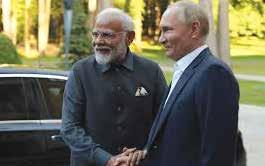
Prime Minister Narendra Modi likes to give bear hugs. But this week, photos
of him wrapping his arms around “my friend Vladimir Putin” in Moscow caused much of the world to catch their breath.
It was a clear sign to the Western world that Putin is not as isolated as the world had hoped and that Modi will maintain ties with the Russian president, despite efforts by the U.S. to woo the Indian premier to their side.
Modi’s trip to Moscow, which overlapped with three days of NATO meetings in Washington, was met with consternation in Washington and Kyiv. Asked about the Modi-Putin meeting, State Department spokesman Matthew Miller told reporters, “We have made quite clear directly with India our concerns about their relationship with Russia.”
On X, Ukrainian President Volodymyr Zelensky posted photos of a children’s hospital in Kyiv that was struck by a Russian missile on Monday and criticized the meeting. “It is a huge disappointment and a devastating blow to peace efforts to see the leader of the world’s largest democracy hug the world’s most bloody criminal in Moscow on such a day,” he wrote.
Modi needs Russia for weaponry and energy and space technology. India also is concerned that Russia will grow too dependent on its rival China.
Putin’s war effort, meanwhile, has

been funded in significant part by Indian purchases of Russian oil products, which have increased almost 20-fold since 2021. Russia, likewise, hopes India will keep its distance from the United States – Putin spokesman Dmitry Peskov mocked the West this week for feeling “jealous” about Russia-India ties.
The Moscow meeting appeared to deepen what the two countries have called a “special and privileged strategic relationship.” Modi announced that India would open consulates in Kazan and Yekaterinburg to enhance ties between the two peoples.
After arriving Monday evening, Modi met Putin at the Russian leader’s Moscow region residence in Novo-Ogaryovo over tea on an outside terrace.
“It is a great honor to visit a friend’s home,” Modi said, as he embraced Putin with his trademark hug.
“We have official talks tomorrow, but today we can talk in a home environment, in my residence,” Putin said. “I’d like to congratulate you on your reelection as prime minister; that is not by accident but a result of your work over many years. You have your own ideas, you are very energetic, and you are successful in achieving results in the name of the Indian people.”
Modi won a third term last month.
embassy to be built in the Brazilian capital in 2010, ratified the agreement on Friday between the Mercosur trade bloc of South America and the Palestinian Authority that had been signed in 2011.
It was not clear whether other Mercosur members would follow suit. Argentina’s right-wing government of President Javier Milei is not expected to do so. Uruguay and Paraguay are both members of Mercosur and have pledged to move their embassies in Israel to Jerusalem.
Palestinian ambassador in Brasilia, Ibrahim Al Zeben, called Brazil’s decision “courageous, supportive and timely.”
It is “the effective way to support peace in Palestine,” he said in a message, adding that he hopes Palestine trade with Mercosur, currently only $32 million a year, will grow.
In February, Brazilian President Lula da Silva compared Israel’s actions in Gaza to those of Nazi leader Adolf Hitler against Jews during World War II.
“What is happening in the Gaza Strip is not war. This is genocide. It is not a war of soldiers against soldiers. It is a war between a trained military against women and children. What is happening in the Gaza Strip against the Palestinian people has not happened at almost any other time in history. In fact, it only happened once; when Hitler decided to kill the Jews,” da Silva claimed.
In response, Foreign Minister Israel Katz called the Brazilian ambassador, Federico Mayer, for a reprimand and told him that da Silva was considered persona non grata in Israel.

Brazil has put into effect a free trade agreement with the Palestinian Authority that has been waiting for ratification for more than decade, in a show of support for the Palestinian people.
“The agreement is a concrete contribution to an economically viable Palestinian state, which can live peacefully and harmoniously with its neighbors,” Brazil’s foreign ministry said on Monday in a statement.
It said Brazil, which recognizes a Palestinian state and allowed a Palestinian

Last week, Mohammad Abu Salmiya, the director of Gaza City’s Shifa Hospital, was set free from Israeli custody and returned to Gaza. According to reports, Israel’s Shin Bet security service has since rebuked the senior official who decided to free Abu Salmiya, whose hospital is used by Hamas as a military base.
Israeli officials launched an investigation into the release, with Shin Bet director Ronen Bar submitting findings to

Prime Minister Benjamin Netanyahu last Wednesday.
Deemed unlikely to perpetrate further terror attacks by Israel’s security agency, Abu Salmiya was released from Israeli prison in an effort to free up space in Israel’s jails, which are not big enough to accommodate the influx of newly-arrested terrorists. According to Channel 12, National Security Minister Itamar Ben Gvir, who is responsible for Israeli prisons, was warned for months about the prison space issue but failed to take any action to resolve the problem.
Social media footage showed Gazans welcoming Abu Salmiya back to the Strip upon his return. The videos triggered immediate anger and confusion within Israel, with several Israeli officials, including Ben Gvir, Defense Minister Yoav Gallant, Bar, the Israel Prison Service, and Netanyahu, blaming one another for the Gazan’s release. The prime minister called the move to set Abu Salmiya free a “grave mistake.”
The Shifa director was detained in November by the Israeli military, which suspected that he had permitted the Hamas terror group to use the hospital as a military base. Beneath Shifa Hospital, where hostage Noa Marciano was reportedly murdered, lies a complex network of Hamas terror tunnels, with Hamas using the hospital as a command center to carry out terrorist attacks on Israel.
According to Abu Salmiya, who said he was “surprised” that some Israeli government officials were caught offguard by news of his release, he was freed without any conditions or charges.
Last week, Matanyahu Englman, Israel’s State Comptroller, said he might launch an investigation into how the Shifa director was released.
Many arrested Palestinians have been released in the past because Israeli prisons don’t have enough room to fit them all, the Shin Bet has repeatedly warned. Netanyahu has instructed the government to form an interagency group to supervise future decisions on whether to release particular prisoners.
On November 11, 1982, in the middle of the First Lebanon War, at least 91 individuals perished at an Israeli military base in Tyre, Lebanon, in what officials
have long held was an explosion caused by a gas leak. However, now, over 41 years later, a new Israeli investigation has found that the explosion was actually caused by a Lebanese suicide bomber.
The investigating commission was led by Maj. Gen. (res.) Amir Abulafia, who used to command the military’s Planning Directorate. Israeli officials said in November 2022 that they had relaunched the investigation into the explosion. In June 2023, Abulafia’s commission was officially established after the Shin Bet investigated the incident and determined that the explosion was very likely caused by a suicide bombing.

“Approaching an investigation of a terror attack that took place four decades ago is extremely difficult, complicated… it is almost impossible since most people [who were there] are no longer with us. And those who are [still alive] don’t remember many of the details,” said an anonymous Shin Bet official involved in the 2023 investigations.
After thoroughly investigating the incident, officials found “with high certainty, maybe even completely certainty, that this was a terror attack and not a gas leak,” the official clarified. Officials read through thousands of relevant documents, spoke to explosive experts, and conducted forensic investigations into the remains of those killed in the attack. Authorities uncovered body parts that belonged neither to Israeli security forces, nor to the Lebanese detainees killed at the base. Additionally, officials found evidence of explosive impact on some of the victims’ bodies and a Peugeot car that was nearby. Two Lebanese civilians also reportedly noted that they saw the vehicle driving past the IDF base on the day of the attack. Two IDF soldiers, at the time, said that they heard the revving of a car engine before the explosion happened.
The white Peugeot 504 vehicle and the unidentified remains were determined to be the suicide bomber’s, according to Abulafia.
Although Israeli authorities initially considered the possibility that the explosion was an intentional bombing, the Military Advocate General, in April
1983, said that the tragedy was more likely caused by a gas leak, based on a lack of familiarity with car bombings and Iranian-proxy groups at the time. Investigators also didn’t have some important intelligence in the early 1980s.
According to the anonymous senior official, the suicide bomber equipped his vehicle with a 50-kilogram bomb and a number of gas cylinders. The powerful explosion caused the Israeli building’s demolition.
Following the tragic attack back in 1982, Hezbollah claimed responsibility, naming the terrorist as Ahmad Qasir, a seventeen-year-old whom the terror group has touted as its first suicide bomber. In honor of the terrorist, a small monument was built in northeastern Lebanon near the city of Baalbek.
“We know that the director of the attack was supported by Iran… there was also some partial involvement by Imad Mughniyeh, one of the founders of Hezbollah, but until today there is still some disagreement between [Hezbollah and other groups] who this attack belongs to,” Abulafia added. “We can say responsibly that the attack was directed by Iran.”
In a statement, the IDF announced that “the committee recommended that from now on, this tragic event will be treated as a terror attack.”
The Israeli army added, “The Tyre disaster is an unfortunate and painful event… and the completion of the investigation is of great importance, both at the national level and as part of the commitment to the families of the fallen as well as to the victims of the disaster and their families.”
On November 4, 1983, another suicide bombing was carried out at the IDF’s Tyre military base; 28 Israelis and 32 Lebanese prisoners were killed in that attack.

It’s been a hard nine months. Since October 7, at least 9,250 IDF soldiers have been wounded in the fighting.
Around 70% of the wounded are reservists, while 30% are either mandatory conscripts or career officers. About
half of those wounded are under the age of 30. Approximately 35% complain of emotional harm, often post-traumatic stress disorder. Unfortunately, the Defense Ministry predicts that the number of wounded will rise to 14,000 by the end of 2024.
In April, the ministry said 7,209 IDF soldiers had been wounded, with 2,111 of them afflicted by emotional suffering. While the 2,111 number represents about 29% of all wounded soldiers, with 1,227, or 60% of those with emotional harm, the emotional problems are the primary problem.
Before the war, the defense ministry had accounted for around 62,000 war-wounded soldiers in all prior conflicts, of whom 18% – or 11,000 – suffered emotional distress. Of those 11,000, around 8,000, or 70%, experienced emotional symptoms as their primary problem.
While post-traumatic stress disorder (PTSD) is the main diagnosis for those with emotional problems, ministry officials emphasized that they recognize and assist with a variety of emotional disorders.

Last week, the security cabinet approved the legalization of five “settlements” in Yehuda and Shomron. But those approvals came with condemnation from nations like France and Canada that claim that Israel is “colonizing” the land.
The five settlements approved were Evyatar in the northern area of Yehuda and Shomron, Sde Efraim and Givat Asaf in the center, and Heletz and Adorayim in the south of the territory. Finance Minister Bezalel Smotrich’s office said that the cabinet had also approved advancing plans for thousands of new homes in Yehuda and Shomron.
In exchange, Smotrich agreed to extend indemnity to Israeli banks working with Palestinian ones in the area for an additional four months and agreed to partially release three months’ worth

of tax revenues that Israel collects on the PA’s behalf, which did not include a significant portion that the PA uses to pay for services and employees in Gaza. Israel said that those funds would end up in the hands of Hamas if paid.
In a statement this week, France’s Foreign Ministry said it “strongly condemns” the moves, as well as Wednesday’s declaration by the Civil Administration of the state’s appropriation of thousands of acres of land in the Jordan Valley.
The statement said that the moves were “extremely serious” because of their implications for the stability of the West Bank and the region.
“Israeli colonization of the Palestinian Territories, including East Jerusalem, constitutes a violation of international law,” France said.
“In addition to being a major obstacle to any just and lasting peace, this policy fuels tensions on the ground as violence perpetrated by settlers increases against the Palestinian population.”
Canada urged the government to reverse the decisions, saying the move was in contravention of international law.
“Canada firmly opposes the government of Israel’s decision to approve new
settlements in the West Bank. Unilateral actions, such as financially weakening the Palestinian Authority and expanding settlements are in contravention of international law,” the Canadian foreign ministry said in a statement on X.
Norway also expressed its condemnation; the United Kingdom said it “strongly opposes” the Israeli government’s recent legalization of the five settler outposts.
Last month, the EU slammed the move as “another deliberate attempt at undermining peace efforts,” while Germany called it “disturbing and cynical.”
Wasel Abu Youssef, a member of the Executive Committee of the Palestine Liberation Organization (PLO), claimed the move is aimed at pursuing a “war of genocide” against Palestinians, adding the settlements are “illegal colonies that violate all international resolutions.
While the international community considers all settlements illegal, Israel differentiates between settlement homes built and permitted by the Defense Ministry on land owned by the state and illegal outposts built without necessary permits, often on private Palestinian land.


Students at Johns Hopkins University owe a debt of gratitude to Bloomberg Philanthropies. Michael Bloomberg, in a letter, announced that his foundation is gifting $1 billion to the medical school at John Hopkins, essentially making the school tuition free for the majority of the students.
The billionaire said the donation addresses twin challenges: declining health and declining education.
According to Johns Hopkins, for most medical school students, the gift will cover the full cost of attendance, including tuition and living expenses. Students from families earning less than $300,000 will be eligible for the gift. Living expenses will be covered for students who come from families that earn less than $175,000.
This is not the first medical school to receive such a gift. In February, students at the Albert Einstein College of Medicine in New York received free tuition after a $1 billion donation from a former faculty member, Dr. Ruth Gottesman. In 2018, NYU’s School of Medicine became the first medical school in the country to offer free tuition to accepted students.
In the letter, Bloomberg, a Johns Hopkins alumnus, said life expectancy in the U.S. is still lagging behind other countries since the pandemic. The pandemic also hurt public education, Bloomberg said, noting that “remote schooling was a disaster for students.” He added that the high cost of medical school deters students from lower-income families from applying.
According to the Association of American Medical Colleges, the average medical school graduate leaves school owing more than $200,000.
Bloomberg previously donated $1.8
billion in 2018 to undergraduate financial aid at Johns Hopkins University.

Columbia University said that it “permanently removed” three deans from their positions at the college after they engaged in “very troubling” text messages during an event about Jewish life on campus.
“This incident revealed behavior and sentiments that were not only unprofessional, but also, disturbingly touched on ancient antisemitic tropes,” President Minouche Shafik said in a statement on Monday.
The text messages were first revealed last month by The Free Beacon, showing how the senior administrators ridiculed some of the panelists regarding the treatment of Jewish students on campus. The House Education and the Workforce Committee, which has spent months scrutinizing elite colleges including Columbia and Harvard for their tolerance of antisemitism, later released the messages.
The administrators involved in the text messages were Susan Chang-Kim, chief administrative officer of Columbia College; Cristen Kromm, dean of undergraduate student life; Matthew Patashnick, associate dean for student and family support; and Josef Sorett, the dean of Columbia College.
The texts dismissed concerns raised by the panelists regarding treatment of the Jewish students at the college. Demonstrations at the university began after the October 7 massacre by Hamas.
“Hard to hear the woe is me, we need to huddle at the Kraft center,” said Chang, referring to the Kraft Center for Jewish Life. “Trying to be open minded to understand but the doors are closing.”
“Amazing what $$$$ can do,” Kromm said, adding at another point: “If only every identity community had these resources and support.”
“I’m going to throw up,” Chang wrote in response to another portion of the discussion when a Holocaust survivor,

30
Orly Mishan, expressed fear about her daughter “hiding in plain sight” while student-protesters embraced Hamas following the terror group’s October 7 massacre in Israel.
“His use of the word Hamas is interesting,” Patashnick claimed elsewhere. “Students generally weren’t protesting for Hamas.”
Sorett, who has apologized for his role in the messages, is staying in his job. The other three will remain on leave.
Shafik, an economist who has been in the role for a year, has been criticized for failing to crack down on antisemitic behavior and allowing encampments at the college.

Sunday was the busiest day in the sky. According to the U.S. Transporta-
tion Security Administration (TSA), 3.01 million airline passengers were screened on Sunday, the highest number ever on a single day.
Sunday’s total topped the previous high of more than 2.99 million set on June 23 after the agency set a record in May, the TSA said on Monday.
Homeland Security Secretary Alejandro Mayorkas said the record-breaking travel had been “spurred by our nation’s strong economy expected to continue in the months ahead.”
Airlines for America said U.S. carriers plan to fly more than 26,000 daily flights this summer, up nearly 1,400 over 2023, or 5.6%, when they carried 255 million passengers. The summer travel season forecast is for June 1 to Aug. 31.
As more Americans fly, the Federal Aviation Administration struggles to address a persistent shortage of air traffic controllers.
Some airlines voluntarily trimmed New York flights last summer to address congestion issues and have raised new concerns about the lack of controllers.
Last month, the FAA said it was again extending cuts to minimum flight requirements at congested New York City-area airports through October

2025, citing air traffic controller staffing shortages.
The FAA said the number of controllers handling traffic in New York is insufficient for normal traffic levels and that without “increased flexibility,” congestion, delays, and cancellations are likely at JFK, LaGuardia and Newark airports.

Need a snack? Reach for some baby carrots. According to a study presented on June 30 at Nutrition 2024, the annual meeting of the American Society for Nutrition, eating three servings of baby carrots a week can offer a significant boost of important nutrients.
Surveys found separately in 2015 and 2019 that only about 1 in 10 American adults ate the recommended 2 to 3 cups of vegetables daily, according to a 2022 U.S. Centers for Disease Control and Prevention report on fruit and vegetable intake: baby carrots. That statistic inspired lead study author Mary Harper Simmons and her colleagues to investigate a simple solution that could increase a person’s weekly vegetable intake.
“[Baby carrots] are grab and go, great with things like ranch, hummus — I’ve even seen people dip them in peanut butter — some people like them plain,” said Simmons, a graduate student in nutrition at Samford University in Alabama. “I would really like to show people that improving your health can be (done) with small simple changes. … It does not have to be one drastic change overnight.”
After four weeks, the researchers found those who ate the carrots had a 10.8% increase in carotenoids in their skin, natural antioxidants found to have health benefits, such as preventing inflammation and promoting heart health, according to the Cleveland Clinic.
Additionally, the researchers found those who only took a multivitamin containing the same carotenoid found in carrots did not see any changes in carotenoid levels. But those who consumed the carrots and the supplement saw the
most benefits and increased their skin carotenoids by 21.6%.
According to the 2022 CDC report, around 7% of adults ages 18 to 30 eat the recommended amount of vegetables, while a 2023 National College Health Assessment from the American College Health Association found that about 1 in 4 college students surveyed said they ate three or more servings of vegetables per day.

Like to mail letters? You may think twice after July 14. The United States Postal Service is set to increase the rate of its “Forever” stamp to 73 cents next week. It’s the second time the United States Postal Service has raised the cost of postage this year.
The “Forever” stamp was introduced in 2007 and cost 41 cents at the time. Since then, the price has steadily increased, most recently in January, when it jumped from 66 cents to 68 cents.
Other postage rates are also set to cost more. Mailing a postcard domestically will cost 56 cents, a 3-cent increase, while the price of mailing postcards and letters internationally are both rising by a dime to $1.65. Overall, postage costs are rising 7.8% increase.
If it makes you feel any better, there will be more “Forever” options to choose from. In June, USPS began offering two new “Forever” stamps — one that depicts baseball legend Hank Aaron and another that pays homage to Canadian-American game show host Alex Trebek. The USPS this year has also launched “Forever” stamps honoring former First Lady Betty Ford, University of California Los Angeles men’s basketball coach John Wooden, and some of the conductors of the Underground Railroad.
Despite raising the price of stamps, USPS can’t manage to stay in the black. The agency in November reported a $6.5 billion loss for fiscal 2023 and is projecting a $6.3 billion deficit in 2024, according to Keep US Posted, a nonprofit advocacy group.


For as long as students at colleges across the United States have protested the war in the Gaza Strip, they’ve drawn the fury of some of the financial world’s mightiest figures.
Now, a prominent Wall Street law firm is taking a more direct approach with protesters. Sullivan & Cromwell, a 145-year-old firm that has counted Goldman Sachs and Amazon among its clients, says that, for job applicants, participation in an anti-Israel protest — on campus or off — could be a disqualifying factor.
The firm is scrutinizing students’ behavior with the help of a background check company, looking at their involvement with pro-Palestinian student groups, scouring social media, and reviewing news reports and footage from
protests. It is looking for explicit instances of antisemitism as well as statements and slogans it has deemed to be “triggering” to Jews, said Joseph C. Shenker, a leader of Sullivan & Cromwell.
Candidates could face scrutiny even if they weren’t using problematic language but were involved with a protest where others did. The protesters should be responsible for the behavior of those around them, Shenker said, or else they were embracing a “mob mentality.”
Private employers in the United States can hire whom they want, with only a few restrictions meant to prevent discrimination. Some have fired workers over their actions or statements since Hamas’ October 7 attack on Israel.
Sullivan & Cromwell’s policy stands out because of the way it holds applicants accountable for the actions of others and considers commonly used protest slogans to be out of bounds.
To Sullivan & Cromwell’s critics, the policy is an effort to silence criticism of Israel on campus and to paint all protesters as equivalent to those who have been heckling and threatening Jewish students.
“When we went through big law recruitment, we knew your social media better be clean, you better not have on

there anything that you can’t defend, you have to be a respectable person to be able to get a job at any of these places,” said Rawda Fawaz, a lawyer for the Council on American-Islamic Relations. “That has always been the practice. Why do you have to have a special policy on this?”
Shenker and others who support this approach argue that it is an extension of existing workplace prohibitions on hate speech. (© The New York Times)

Boeing has agreed with the Justice Department to accept a plea deal, wherein the aerospace company would plead guilty of defrauding United States regulators in a series of crimes that led to the crashes of two 737 Max jetliners and the deaths of 346 passengers.
Last week, prosecutors gave Boeing the ultimatum of either pleading guilty to the charges and paying a fine or going to trial and being criminally charged with conspiracy to defraud the U.S. government. Federal prosecutors have said that Boeing lied several times, leading regulators to approve the Arlington, Virginia-based company’s airplane and pilot-training requirements.
If U.S. District Judge Reed O’Connor, the federal judge who has been overseeing the case, approves of the deal, Boeing will have to pay a fine of around $243.6 million and will be forced to invest $455 million or more in safety initiatives. Additionally, a third-party would have to be appointed to, for the next three years, supervise Boeing’s safety and quality efforts. If O’Connor rejects the deal, which is supposed to be formally presented to him by the DOJ by July 19, Boeing and the Justice Department would have to engage in further talks.
This case does not have any bearing on the incident in January, when a Boeing airplane’s panel flew off in the middle of an Alaska Airlines flight. This deal is only relevant to the actions that led to the crashes of two flights – one in Indonesia and the other in Ethiopia.
The flight in Indonesia crashed be-
cause Lion Air pilots weren’t aware of a feature wherein the plane’s nose could be pushed down without pilot input. While Ethiopian Airlines pilots knew about the flight-control software, the feature was suddenly activated due to a broken sensor, leading the plane to fly out of the pilots’ control. In 2021, the DOJ said that Boeing misled FAA regulators and failed to inform them about the new software, which wasn’t a part of the 737’s older models. At the time, Boeing alleged that two of its low-level workers were at fault for deceiving regulators.
Lawyers representing the loved ones of those killed in the two Boeing plane crashes have urged the judge to deny the deal.
“This sweetheart deal fails to recognize that because of Boeing’s conspiracy, 346 people died. Through crafty lawyering between Boeing and the DOJ, the deadly consequences of Boeing’s crime are being hidden,” charged lawyer Paul Cassell, who represents some of the families.
In 2021, the DOJ and Boeing initially reached an agreement, with the Justice Department deciding that it wouldn’t prosecute the aerospace company on the condition that it complies with a number of rules for three years. In June 2024, however, federal prosecutors said that Boeing went against the conditions of the 2021 agreement.

On Friday, 29 CPKC train cars fell off the tracks in a marshy area around 140 miles away from Fargo, North Dakota. The train had been carrying anhydrous ammonia and other hazardous materials, resulting in a fire.
No one was hurt in the fire, and officials put a shelter-in-place notice out for residents to monitor their air levels. The notice was lifted on Sunday when air monitoring levels returned to zero.
Railroad spokesman Patrick Waldron said that track repairs were completed early Monday, and rail traffic resumed following track safety inspections.
Exposure to high concentrations of

ammonia in the air can cause burning of the eyes, nose, throat and respiratory tract, and can result in blindness, lung damage or death, health officials say. Exposure to lower amounts can result in coughing and irritation of the nose and throat.
The National Transportation Safety Board and Federal Railroad Administration is investigating the cause of the derailment.

This past 4th of July weekend saw a major uptick in gun-related crimes in Chicago, with 109 individuals shot, resulting in nineteen deaths. In the U.S. in general, July 4 is usually the day with the most mass shootings.
“When we look at what happened this weekend, we always like to say that it’s a police issue,” said Larry Snelling, the Chicago Police Department’s Superintendent. “This is a societal issue. The police cannot be in everybody’s backyard. They cannot be in everyone’s home. They cannot invade every single gathering where there’s a possibility that someone may show up with a gun.”
Some officials blame the uptick in gun violence on the hot weather, with Chicago Mayor Brandon Johnson declaring that the violence in his city has been caused by “generations of disinvestment and deep disenfranchisement.”
On Friday, July 5, Johnson said of the shootings, “We are devastated by the recent violence that has left our city in a state of grief and we extend our heartfelt condolences to the families and communities impacted by these recent events. The City of Chicago is committed to ensuring the safety of all residents and visitors.”
Johnson added that, because of the violence, police officials wouldn’t be receiving off-time for July 4 weekends in order to “maximize presence and ensure prompt incident response.”
According to the Chicago Police Department’s online records, over the week-
end, an eight-year-old boy was killed in the same shooting that saw a five-yearold and another eight-year-old getting shot. A number of fifteen- and sixteenyear-olds were also shot. A forty-yearold was shot dead, while six others were injured in the same shooting. Elsewhere, eight individuals, aged eighteen to seventy-four, were injured in another shooting.
Currently, police officials are preparing to defend next month’s Democratic National Convention from any potential threats.
“Along with that, we have been working on a neighborhood plan to make sure that we’re not pulling resources that are necessary to keep our neighborhoods safe to place down and around the footprint of the DNC,” said Snelling.
“We are going block to block, neighborhood by neighborhood, to make sure that the city is safe and ultimately stop this violence,” Johnson added. “These are not just numbers on pages. These are our fellow Chicagoans.”


These kids love the train and can’t seem to get enough of it.
A group of eight British teens – ages 16 and 17 – spent a good part of their day riding the London Underground. They managed to visit all 272 stations with a time of 18 hours, 8 minutes, and 13 seconds.
The group, who call themselves The Amersham Ambushers, were required to visit every London Underground stop using only public transportation. They began their record attempt at Heathrow Terminal 5 and went full steam ahead, ending at Amersham station.
The self-described train nerds had attempted what they called “The London Tube Challenge” twice before, but only found success on their third try.
“We wanted to complete this record for two reasons,” team member Arthur Phillips told Guinness World Records “It was a fun puzzle planning the route
as some of us are quite mathematically inclined, and additionally, it allowed us to explore parts of London that we hadn’t ever had reason to go to before.”
The group managed to complete the arduous task in record time, beating the previous record-holder’s time by 1 hour and 56 minutes.
Phillips explained, “A mixture of arguably luck and also a much-improved route allowed us to beat the record by such a margin.”
The previous record-holder was good-humored about losing their title and will soon be meeting The Amersham Ambushers for lunch.
All aboard!

Napoleon Bonaparte rose to prominence during the French Revolution and was the leader of the French Republic and then the French Empire, as he controlled much of Europe. Despite winning many battles against a coalition of European states after his invasion of Russia, Paris fell to the enemy on March 31, 1814. Napoleon was shattered by the defeat.
Napoleon eventually abdicated the throne and fled to Elba.
A pair of pistols once owned by the French emperor that were given to his friend in 1814 were recently sold at auction for $1.83 million. They were originally valued at an estimated $1.3 million-$1.63 million.
The guns were sold in a Burr walnut box with an ebony inlay. The lid of the box is lined with green velvet embroidered with the letter N, which is bordered with embroidered flowers. The box and two guns also bear Napoleon’s cipher.
Last November, one of Napoleon’s famous black hats was sold for a record $2.1 million.
The guns were declared a National Treasure by the French government last week, meaning they cannot leave the country.
“This pair of pistols represents the fall, the end, the abdication” of the French emperor, auctioneer Jean-Pierre Osenat said
in a video posted by the auction house.
Napoleon died in Saint Helena in 1821 at the age of 54. He once said, “Impossible is a word to be found only in the dictionary of fools.”

A bank robber in Florida handed a bank teller a note demanding cash and was arrested for robbery last week.
The heist occurred in a Chase bank in Lady Lake, Florida.
According to the arrest report, Michael Patrick Fleming walked into the bank and filled out a withdrawal slip and handed it to a teller. “The defendant was told he could not be given $00.01,” police noted.
Yup, that’s all the guy wanted: one cent.
After being denied a penny, Fleming, who does not have a Chase account, reportedly told the teller, “So you want me to say the other word?” The teller “was in fear that possible violence was imminent” and “notified law enforcement,” cops say. When police responded to the 911 call, Fleming was still inside the bank. He was taken into custody and was interviewed by investigators.
Fleming told police that he had gone to another bank, but that bank was closed, so he headed to Chase. He said he expected the teller to give him the penny and then said he would have sat “in the chair and wait[ed] for law enforcement.”
According to him, “his goal was to be arrested.”
Well, his plans worked out OK, because he is now sitting in jail in lieu of a $5,000 bond.
Fleming was evicted from his mobile home last month. Perhaps he just wanted a place to relax for a while. Then it would all make “cents.”
With Joey Chestnut out of the race, Patrick Bertoletti nabbed the title at the annual Nathan’s Famous Fourth of July
hot dog eating contest last week, scarfing down 58 dogs to earn the trophy. In the women’s competition, defending champion Miki Sudo won her 10th title and set a new world record by downing 51 links.

Joey “Jaws” Chestnut, the reigning men’s champion and winner of 16 out of 17 previous competitions, didn’t attend this year over a sponsorship tiff. Instead, he competed later in the day against four soldiers at a U.S. Army base in El Paso, Texas, where he wolfed down 57 hot dogs in five minutes.
Bertoletti, 39, of Chicago, said he lost weight and practiced for three months
with “an urgency” to prepare for the event, thinking he had a good chance of winning.
“With Joey not here, I knew I had a shot,” Bertoletti said. “I was able to unlock something that I don’t know where it came from.”
Bertoletti bested his prior record of 55 hot dogs at the event, which is held every Independence Day on New York’s Coney Island, a beachfront destination with amusement parks and a carnivalesque summer culture.
Earlier, in the women’s competition, Sudo, a 38-year-old dental hygiene student from Florida, once again carried the day.
“I’m just happy to call this mine for another year,” Sudo said after winning the pink belt.
Bertoletti’s victory marks the first time the famed mustard belt and $10,000 prize money has gone to someone besides Chestnut since 2015.
Let the top dog win.


















Week 2 at Hillel Day Camp was filled with activities, specialties, excitement, entertainment, and the start of trips! This week’s amazing trips included Dave & Busters, Q-Zar, Launch, XPlore, and Laser Bounce. Not only do our campers venture off campus for trips, but Hillel Day Camp also brings extra excitement to our campus! This week’s on-campus entertainment included a Ninja Warrior course, the Jeff Boyer Bubble Show, and Wonder Spark Puppets.
On Wednesday, the whole camp was decked out in patriotic red, white, and blue to celebrate the Fourth of July.
We closed out the week with beautiful Onegs showing our strong ruach and announcing the Campers of the Week from each bunk. Selected by our dedicated counselors and division heads, these campers show compassion and excellent listening skills. Each Camper of the Week receives this year’s edition of the Hillel towel, a special keepsake celebrating the strong bond between Israel and the United States. We are also excited to honor our weekly Middot Awardees, campers who demonstrate exceptional middot of kindness, respect, and a helpful spirit toward their bunkmates and counselors. Middot awardees receive special edition prizes in the colors of the Israeli army,
which highlight our deep connection to Israel and our respect for those who protect the Jewish people. Boys will be awarded a kippah, while girls will receive a scrunchy and a bentcher. These gifts honor the bravery and dedication of the soldiers fighting for our Jewish homeland, personal safety, and heritage.
Hillel Day Camp’s goal is for every camper to have a positive and fun experience playing sports. We emphasize having fun while playing sports. Hillel Day Camp’s professional sports staff consists of both male and female coaches with many years of experience playing and coaching in yeshiva and secular school sports.
The focus of our sports staff this year is to introduce fundamental gross motor and sports skills to our younger campers, preparing them to participate in team sports and leagues both at Hillel Day Camp and in extracurricular sports outside of camp. Those skills include hopping, leaping, skipping, galloping, dribbling, striking, catching, and throwing. Those skills are practiced daily with our Upper Division campers in our wide variety of fun and competitive sports leagues of basketball, softball, soccer, hockey, and kickball.

















Moishe Oiring ensures tuition concerns won’t prevent Touro students from completing their education
It’s a great irony that Moishe Oiring was named Touro University’s 2024 Alumnus of the Year. The 2011 graduate, who just made a substantial donation to the university, almost wasn’t a college graduate at all.
Oiring had been enrolled in Touro in the early 2000s and was a few credits short of completing his undergraduate degree. Unable to afford the tuition, he had no choice but to drop out. He got a second chance a decade later while working for former New York Gov. David Paterson’s reelection campaign. While meeting with Touro founder Dr. Bernard Lander, z”l, the subject of Oiring’s incomplete degree came up in conversation, and Oiring said Dr. Lander told him, “Every Jewish kid has to have a degree” and that he could complete his college studies free of charge.
The long gap between the beginning and end of his undergraduate education was challenging, but Oiring, who grew up in Brooklyn and now lives in Hewlett Harbor on Long Island, said he wasn’t left to sink or swim on his own.
“I wasn’t just dropped off and told, ‘Here’s a scholarship. Good luck.’ There were dedicated people assigned to help me through it,” he said. “Coming back 10 years later is very, very hard, and the curriculum had changed and things were done in a different way, so having people I was assigned to on campus was very helpful.”
Ultimately, he graduated from Tou-
ro’s Lander College of Arts & Sciences in 2011, and since then his success has been meteoric. He is the founder of the Oiring Group and long-time COO of Pleet Homecare, and an innovative CEO in the healthcare sector, Oiring has led numerous initiatives that enhance patient access to high-quality care, reduced costs, and improved overall patient satisfaction. Over the course of his career, he has improved efficiency in patient care by leading the industry in the adoption of Electronic Health Records and broadened access to care for the underserved through telemedicine and leveraged data analytics to predict healthcare trends and assist in disease prevention.
Would he have been able to achieve so much without a college degree?
“I don’t think so, because when you don’t graduate, you’re limited in your opportunities,” Oiring said. “The value of a college degree is priceless: In order to advance in so many careers, you need a college degree, so because I had earned mine, I was able to accomplish things that I don’t think I would have had the opportunity of doing.”
After his own struggles affording college tuition, Oiring’s financial gift will go toward Touro scholarships to help others avoid the same problems.
“It’s about giving students that are just like me, the people that come from middle income families that just don’t make the cut,” he said. “It’s the people whose

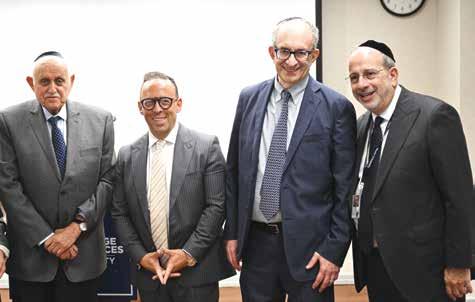
parents are working, trying to do the best they can for the kids that are stuck in this pendulum more than anybody else.”
Oiring’s financial support also enabled Touro’s Lander College of Arts & Sciences to dedicate its library, which it did on June 19 at the campus in Brooklyn, in honor of Susan Aldrich, his friend and mentor. Aldrich, the executive vice president of RiverSpring Health Plan, founded and grew one of NY state’s largest Medicaid managed long-term care programs. She has worked in managed care for the elderly for more than 30 years and run the nation’s largest program of all-inclusive care for the elderly.
“Moishe truly exemplifies the values of Touro University—striving for the highest level of professionalism and suc-
cess in his field, while giving back to those in need every single day,” said Dr. Alan Kadish, president and CEO or Touro University. “Indeed, he seems to be in a perpetual state of making a kiddush Hashem as he continues on a mission to leave the world in a better place through his many personal and professional endeavors.”
Despite his substantial support of Touro and his generosity toward its students, Oiring said he was caught off guard when he got the call informing him that he would be presented with Touro’s Alumnus of the Year Award
“That was incredible, and I did not expect that, to be very sincere,” he said. “It was very nice and it just reaffirms my commitment to the university even more.”
Mauna Kea and Mauna Loa, twin volcanoes in Hawaii, are much taller than Mount Everest, although much of their height is submerged underwater.

with Sanitation Commissioner Irving J. Kaminetsky at the sanitation elections this week












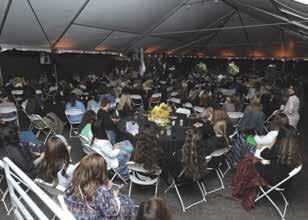



















by Rabbi Yitzchok Caplan
Dollars and Pebbles from Heaven Pestilence comes to the world…; the sword of war comes to the world…; wild beasts come upon the world…; exile comes to the world… (Avos 5:11)
As with the first three punishments mentioned in the previous Mishnah, the mefarshim explain that these punishments are essentially wake-up calls sent by the Creator to arouse people from their spiritual slumber. Yet, there is a difficulty with this explanation. If indeed Hashem merely wishes to wake us up, why does He have to resort to punishments? Couldn’t He arouse us in a more pleasant fashion? We can understand the necessity for such tactics with the following story.
Yankel worked in a high-rise office building in Manhattan. One day, as he stood by the window, an important document fell out of his hands and landed on the ledge outside. Without thinking too
much, he nimbly climbed out the window onto the ledge and watched in horror as the window came sliding down after him, effectively locking him out of his workplace. There he stood, hundreds of feet above the street, on a thin ledge outside his empty office.
After he got his bearings, he realized that the only way out of his predicament would be to catch the attention of the people walking below. He pulled out his wallet and began dropping coins, but the people just bent down, picked up the coins, and continued on their way. He started getting anxious and he began dropping, first single dollars, and then fives, tens, twenties and even a fifty, in the hope that someone would look up to determine from where the bounty was originating. Yet, to his great dismay, nary a glance was offered upward. In complete desperation, he crumpled up a hundred-dollar bill and hurled it downward toward the street teeming with people. Once again he was disappointed. The lucky fellow who found the hundred

dollars bent down, unfolded the crumpled bill, and pocketed it without giving a thought as to its origin.
In complete frustration, he grabbed a handful of pebbles from the flowerpot on the windowsill and threw them downward. As soon as they hit the ground, a group of people angrily looked up in search of the perpetrator. He ecstatically began waving his hands, and once the people noticed him, help was not long in coming.
This story is a great mashal for one’s relationship with Hashem. He showers a person with bounty in the form of health, wealth, family, happiness, and countless other gifts. Yet, His benevolence rarely succeeds in catching the person’s attention. The person perceives all good as a given, and not as something allotted on an individual basis. Thus, often Hashem has to resort to less pleasant tactics to try to get a person’s attention. Sure enough, when a difficult situation arises, almost invariably a person turns his eyes Heavenward.

Reprinted from Rav Wolbe on Pirkei Avos by Rabbi Yitzchok Caplan with permission from the copyright holder, ArtScroll Mesorah Publications.

The first full week of Avnet Country Day school featured an array of spectacular sports, amazing activities and thrilling trips. It was evident in the lead up to Independence Day that the Avnet experience is more than just fun and games. Avnet’s STEM program showcased the science of fireworks as a timely lesson. Campers were captivated as Morah Jenn Stein explained the concept of propulsion and how this allows the fireworks to rise in the air. Studious sparks flew from this lesson and campers’ imaginations were ignited. Rikki From and Eliana Meir, from the Agamim division, decided to take their learning to greater heights. In an impressive display of determination, the girls gave
themselves homework and continued to research the subject. They returned to camp with a mind-blowing poster board that illustrated their investigative efforts and outlined fascinating facts about fireworks. Wow!
“Homework is certainly not an Avnet requirement, but we definitely strive to educate our campers in fun and creative ways with programs like STEM. The relaxed environment camp offers is an ideal way to encourage interests and expand education when school is out,” said Daniel Stroock, Camp Director. “We’re so proud of these girls for their initiative, creativity and the tremendous effort they made to share what they learned with fellow campers.”




From the 1940s to the ‘60s, many comedians got their start telling jokes in the Borscht Belt, which was the name for the various Jewish summer resorts located in the Catskill Mountains. Here are some of those lines:

“Someone stole all my credit cards, but I won’t be reporting it. The thief spends less than my wife did.” - Henny Youngman

“I’ve got a friend who is half-Jewish and half-Italian. If he can’t buy it wholesale, he steals it.” - Jackie Mason



“The guy who invented the first wheel was an idiot. The guy who invented the other three, he was a genius.” - Sid Caesar

“The first time I see a jogger smiling, I’ll consider it.”Joan Rivers

“I never forget a face, but in your case, I’ll make an exception.” - Groucho Marx

“I could tell my parents hated me. My bath toys were a toaster and a radio.” - Rodney Dangerfield

“The doc told me I had a dual personality. Then he lays an $82 bill on me, so I give him 41 bucks and say, ‘Get the other 41 bucks from the other guy.’”- Jerry Lewis

“I told the doctor I broke my leg in two places. He told me to quit going to those places.” - Henny Youngman

“A committee is a group that keeps minutes and loses hours.” - Milton Berle
“Too bad that all the people who know how to run the country are busy driving cabs and cutting hair.”George Burns

“I hate housework. You make the beds, you wash the dishes, and six months later you have to start all over again.”- Joan Rivers
A man drove from New York City to Woodborne. At the end of his trip, he discovered that one of his tires had been punctured. How was he able to make the drive?
Answer: It was his spare tire.

Covid protocol is still observed in camp – if you try hugging your son, he will call Fauci to arrest you.
If your son’s bunk smells like a barn, that’s an improvement. Imagine what it smelled like before they bribed the kids with Dougie’s to clean it for Visiting Day!
The parking lot will be muddy, even if it hasn’t rained in two weeks.
You must take your son to Walmart… because you already bought out Amazon before camp.

Your son definitely needs more soda, even though he brought 60 cans to camp and has only been there for 10 days.
Your son is saving all of his deodorant for the deodorant spraying battle on the last night of camp.

Toothpaste is magical – no how much the kids “use it every day,” it somehow remains full.
If your son’s counselor looks like he is 14, that’s because he is 14.
Just because your daughter’s bunk is immaculate, her clothing are pressed, and her nosh basket looks like a vending machine, don’t expect her to be that way when she gets home.
Yankel was concerned about his wife’s hearing. He decided to test it without telling her. He went to the corner of the room about 15 feet away from her and said, “Sarah, can you hear me?”
No response.
So he went about 5 feet away from his wife and again said, “Honey can you hear me?”
Still no response.

So he leaned over the back of her chair and raised his voice asking, “Sarah! can you hear me?”
Sarah put down her book and replied, “Yankel, I said ‘Yes’ three times!”
The Torah interrupts, so to speak, its narrative of the events that befell the Jewish people in the desert with the description of a commandment that admittedly has no rational human understanding in logical terms. Even the great King Solomon, the wisest and most analytical of all humans, was forced to admit that understanding this parsha of the Torah was beyond his most gifted intellect and talents.
If the Torah is meant to instruct us in life and its values, to improve and influence our behavior and lifestyle, and to help us achieve our goal of being a holy people, then why insert this parsha in the Torah when it can seemingly have no practical impact on our daily life or broaden our understanding of G-d’s omnipresence in our lives?
Though there is a section of Mishnah devoted to the laws and halachic technicalities of the sacrifice of the “red cow,” it does not deal with the underlying motives for the existence of this commandment, and it also does not address why this parsha is inserted in the midst of the description of the events that oc -

By Rabbi Berel Wein

curred in the desert to the generation of Jews who left Egypt and stood at Mount Sinai.
We have historical record and description in the Mishnah and from non-rabbinic sources as to the actual
I think that perhaps the Torah comes to point out the very fact that human life is, in fact, always irrational and that human behavior many times defies any logic or good sense. How could the generation that left Egypt and witnessed
In spite of our best efforts and our constant delusion that we exist in a rational world, the Torah here comes to inform us that that is a false premise.
performance of the commandment in Temple times. This comes as a reminder of our necessary obeisance to G-d’s commandments even if they are not always subject to actual human understanding. Yet, some glimmer of comprehension is demanded by us to make this parsha meaningful to us.
the revelation at Sinai complain about food when there was adequate Heavenly food? How could they prefer Egypt or the desert itself over living in the Land of Israel? And how could Moshe’s and Aharon’s own tribe and relatives rise against them in defiant and open rebellion?
Are these not basically incoherent and irrational decisions with a terrible downside to them? And yet they occurred and continue to recur constantly in Jewish and general life throughout history. In spite of our best efforts and our constant delusion that we exist in a rational world, the Torah here comes to inform us that that is a false premise. If everyday life defies logic and accurate prediction, then it is most unfair and in fact illogical to demand of Torah and G-d to provide us with perfect understanding of commandments and laws. The Torah inserts this parsha into the middle of its narrative about the adventures of the Jewish people in the desert to point out that the mysteries of life abound in the spiritual world just as they do in the mundane and seemingly practical world.
One of the great lessons of Judaism is that we are to attempt to behave rationally even if at the very same time, we realize that much in our personal and national lives is simply beyond our understating.
Shabbat shalom.

Regarding the nature of Moshe Rabbeinu’s sin in striking the rock to bring forth water for the Jewish people, Rav Shmuel Dovid Luzzatto, zt”l, the great-grandson of the Ramchal, wrote that “While Moshe Rabbeinu only committed one sin. The commentaries heaped thirteen or more sins upon him because each one attributed some novel sin based on his own understanding...” The Torah tells us very little about the reason for the drastic consequences of Moshe’s sin. We must therefore understand the commentaries’ explanations rather than inventing any new sins to add to the already long list. There is a well-known dispute between the Rambam (Shmonah Perakim, Ch. 4) and Rashi (on Bamidbar 20:12) regarding the nature of Moshe’s sin.

By Rav Moshe Weinberger
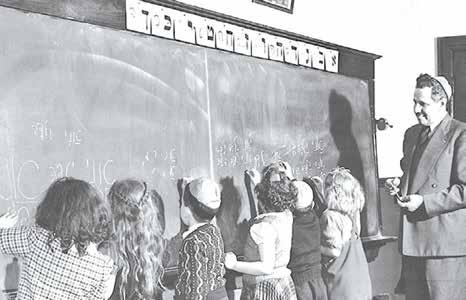
According to the Rambam, his sin was excessive anger when he said (Bamidbar 20:10) “Listen, you rebels.” According to Rashi, however, his sin was disobeying G-d by hitting the rock when he was commanded to speak to the rock. While the Ramban takes issue with both of these explanations, the Maharal in Gur Areye and Rav Levi Yitzchak of Berditchev in Kedushas Levi explain that, on a deeper level, the Rambam’s and Rashi’s explanations are not mutually exclusive. Each refers to a different stage in one process. The process began with Moshe becoming angry and that anger caused him to disobey Hashem’s command to speak to the rock.
Hashem speaks to us in every generation through the Torah as if it is being given today. We must therefore un-
derstand what we must learn from the nature of Moshe’s sin in order to know what is right in our own generation. The first step in that process is understanding the difference between the events in Parshas Chukas and the events in Parshas Beshalach when Moshe first drew water from a rock (Shmos 17:1-7). There, the people lacked water and came to complain to Moshe, Moshe told Hashem that he was afraid they would kill him, Hashem told him to hit a rock, he did so, and water began flowing from the rock to fulfill the Jewish people’s need for water. What is the difference between these two events? Why was it a mitzvah for Moshe to hit the rock shortly after the Jewish people left Egypt but a grave sin to do so in their last year in the desert before entering Eretz Yisroel?
The difference was the generation. Moshe was commanded to hit the rock for the generation that left Egypt. This older generation grew up as slaves in Egypt. They were familiar with the language of force and harshness. For them, when Moshe hit the rock, using force to extract the water, he was speaking the language of the old style of education understood by that generation. However, the generation in Parshas Chukas lived forty years later. They grew up in the desert protected by Hashem who provided for all of their needs. They were a softer, weaker generation. This new generation, on the brink of entering Eretz Yisroel, understood a different language. Hashem expected Moshe to speak to the new generation in a language it understood, the language of conversation,
speech, and dialogue. That is why He commanded Moshe only to speak to the rock and not to strike it.
In our times, too, we see this distinction between the “old generation” and the “new generation.” Our parents and grandparents who lived through the war grew up for the most part under the control of totalitarian regimes or dictatorships and were accustomed to the harsh language of force. That generation also educated its children using the language of strict discipline and force. That approach does not work in the current generation. The old generation was not broken by the old approach to education. But if anyone tries to use the old way of discipline on the new generation, he will only shatter the lives of his students. Such an approach to education no longer works. It is simply outdated.
What happened to Moshe Rabbeinu in Parshas Chukas? When he lifted up his staff to hit the rock just as he had done forty years earlier for the previous generation, he revealed that, on his level, he did not appreciate the difference between the generations. As great as he was, he could not speak the language of the new generation. He was still educating people the way it was done in the “old country.” He did not understand how to communicate with the generation in its way, which was through speech, conversation, and dialogue. The new way is one of (Devarim 6:7) “And you shall teach your children and speak to them.” The way of the new generation is speaking with one’s children rather than using force to elicit their compliance. It was not so much that Moshe was punished by not being allowed to bring the Jewish people into Eretz Yisroel. Rather, it was a natural consequence of the fact that he was no longer able to understand the true nature of the new generation. He could not be the person who would lead them into the land. But Yehoshua, his successor, did lead them into the land. It is known that Rashi (on Bamidbar 11:28) teaches us that Eldad and Medad had prophesized that “Moshe will die and Yehoshua will bring the Jewish people into the land of Israel.” What was Yehoshua’s approach to education? The pasuk at the end of the book of Yehoshua (24:27) tells us that at the end of his life, Yehoshua established a large stone as a monument and said that “it has heard all of the words of Hashem which He has spoken to us.” Yehoshua understood that one can also speak to a stone and it will hear. He understood that the nature of the new generation is one of conversation
rather than coercion.
These two approaches to education also manifest themselves in a remarkable teaching by the Gemara (Sanhedrin 24a), which says:
Rav Oshea says, “What is meant by the pasuk (Zecharia 11:7), which says, ‘And I will take two staffs. I will call one pleasantness and I will call the other violence.’ The one called ‘pleasantness’ refers to the sages of Eretz Yisroel, who
thority, but we may not ignore the nature of the generation.
A friend of mine attended parent-teacher conferences for his sixth grade son one year. This son gave my friend a lot of aggravation at home, so he expected to hear a similar report from his son’s rebbe. But the rebbe’s report was glowing. After confirming that he and the rebbe were indeed referring to the same boy, my friend told the reb -
Hashem speaks to us in every generation through the Torah as if it is being given today.
discuss halacha sweetly with one another. ‘Violence’ refers to the sages of Bavel, who do violence against one another in their discussion of halacha.”
We therefore see from this Gemara that the way of education for the old generation, the generation of exile, Bavel, is violence, force, and coercion. But the way of education in Eretz Yisroel, the way of the new generation, the way of redemption and Moshiach, is one of pleasantness.
For reasons only truly known to Him, Hashem conducts the world in this way. Each generation has its own unique character. Some people may want to rail against this, asking, “Why does it have to be that way?” “If it worked then, it should work now!” or “That’s our mesorah in education!” They can ask these questions, but if they attempt to educate this generation the way the previous generations educated their children, it simply will not work.
Rabbi Shimon Bar Yochai (Zohar 128a) even said in his time that while in previous generations the main point was strictness and fear of punishment, “For us, the matter is dependent on love.” In our generation, too, we see that fear was the modus operandi for prior generations who lived in monarchies and dictatorships. To a large extent, this worked. But we now live in democracies, countries in which everyone has a right to his opinion. Now, we communicate with one another by talking things over, with the staff of pleasantness. It goes without saying that we do not turn our houses into democracies, giving our children a vote on all household decisions. There must be authority, limitations, and boundaries. It is difficult to find the correct balance between dialogue with parental au-
be that he did not understand why his son acted so different in yeshiva than he did at home. This rebbe was a baal teshuva from the Midwest with a very sweet, simple approach, and he asked my friend, “Do you every talk with your son?” After thinking for a few moments, my friend answered that he really hadn’t. He asked his son to do things. He learned with him, he disciplined him. He even told him he was doing a good job once
in a while. But he never actually had a conversation with him. The rebbe then suggested that he should talk with his son because the boy has some very deep thoughts about things. We must educate our children in the context of dialogue, of actually communicating with them.
Persuasion through conversation is the way to bring redemption in this generation. In fact, the Hebrew word Moshiach shares the same root as the word sichah, conversation. The prophet Yeshaya (11:4) says about Moshiach that “he will smite the land with the rod of his mouth and will put the wicked to death with the breath of his lips.” Using only his mouth, words of dialogue, teaching, conversation, and persuasion, he will turn the wicked around and bring about the ultimate redemption.
May we merit to recognize the nature of our generation and educate our generation according to its unique path and thereby see the revelation of Moshiach soon in our days.
Rav Moshe Weinberger, shlita, is the founding Morah d’Asrah of Congregation Aish Kodesh in Woodmere, NY, and serves as leader of the new mechina Emek HaMelech.

By Rabbi Avrohom Sebrow
In July 2001, Chief Justice Roy Moore of the Alabama Supreme Court had a massive granite monument – it weighed more than two tons – of the Ten Commandments placed in the Alabama state judicial building. Lawsuits were subsequently filed, claiming that the public display violated the U.S. Constitution’s principle of separation of religion and government. Many religious groups argued that the public display was legal. Two years after the installation, U.S. District Judge Myron Thompson ordered the monument removed.
Lehavdil, years before that incident, a more serious question was raised. Are there any halachic impediments to the public display of the Aseres HaDibros in a shul? And, incidentally, what is the true shape of the Luchos?
One can question whether displaying the Aseres HaDibros at all is appropriate. The Shulchan Aruch, in the very first siman, states that one should recite the Aseres HaDibros daily. The Mishnah Berurah says that this serves as a daily reminder of Ma’amad Har Sinai, which is a cornerstone of our faith. Nonetheless, the Rema writes that the Aseres HaDibros should only be recited privately. A public recital might lead someone to erroneously assume that the Torah comprises only the Ten Commandments. Further, the Mishnah Berurah cautions against commissioning an Aseres HaDibros display for a shul. The reasoning is the same; no one should walk away with the notion that there are only ten mitzvos in the Torah.
As far as the shape is concerned, a Gemara we learned recently (Bava Basra 14a) discusses what was in the Aron HaKodesh. Though the contents are subject to dispute, everyone agrees that the Luchos were in them. The Gemara states that the Luchos were each six tefachim wide and six tefachim long. (There are some variant texts.) The Gemara discusses how snugly they fit in the Aron
in each dimension and how much room was left over. There is no mention of any space being left over due to the curvature of the Luchos. The implication is that the Luchos were square.
The Gemara refers to the length and width of the Luchos. The Tosafos Rosh questions which side of the Luchos was called the “width” and which was the “length.” How do you determine which side of a square object is called the length and which side is called the width? Evidently, it was a matter of fact that the Luchos were square. (He notes that, according to the Yerushalmi, the Luchos were rectangular. Still, the corners were square, not rounded.)
However, in the recent past, the typical pictures of the Luchos that adorned many shuls represented them with rounded tops. A certain shul in South Africa had such a representation, and one of the congregants was not pleased. He claimed that round Luchos are a non-Jewish innovation and have no place in a shul. Some wrongly assume that Michelangelo was the first person to depict the Luchos with rounded tops when he painted the Sistine Chapel. Further, the congregant reasoned, the display had the Aseres HaDibros written on the Luchos, and the congregant raised concerns about this as well.
The congregant went with a representative of the shul to ask Rav Moshe Sternbuch, shlita, who was still living in South Africa at the time, for a ruling. (Rav Sternbuch is now the Nasi of the Eidah HaChareidis of Yerushalayim and the chief of its beis din.)
Rav Sternbuch didn’t agree that round Luchos are definitively a non-Jewish innovation. He suggested that perhaps a Jewish artisan liked the look of round Luchos, so he built his display that way. Is it a conclusive fact that indeed Rembrandt was the first artist to depict the Luchos with rounded tops? Perhaps he saw a Jewish artist’s representation

and just followed suit. Perhaps it was indeed Rembrandt’s own inspiration, but a Jewish artist independently came up with the same idea. Michelangelo actually depicted the Luchos with square tops.
Various sources suggested that the inspiration to make the tops of the Luchos rounded might have come from a verse in Mishlei. The verse (3:3) states, “Write them on the Luchos of your heart.” Perhaps therefore the tops of the Luchos were rounded to somewhat resemble a heart. Of course, just making the Luchos curved on top does not make them actually resemble a heart, but the universal heart symbol, which it does somewhat resemble, can be traced back to the 1400s.
Even if the innovation was introduced by a gentile, in any case, the Luchos in shuls aren’t scale models; they are just a rough representation. They are imprecise models in many ways, so what’s the big deal if they deviate from the originals with their rounded tops, as well?
Moreover, recent research has uncovered an illustrated handwritten Machzor from 700 years ago. This German manuscript depicts the Luchos as rounded. There is no reason to believe at this point that the rounded innovation was the work of a gentile.
In regard to the public display of the Aseres HaDibros, Rav Sternbuch didn’t feel that it was much of a problem, either.
The situation mentioned in the Mishnah Berurah is having the Aseres HaDibros displayed by itself; that it can lead an observer to wonder why the Aseres HaDibros is given more prominence than any other section of the Torah. But in regard
to a Luchos display, the intent is to display an artistic rendition of the Luchos. To complete that image, the Aseres HaDibros are written on it. They are just being used to complete an artistic creation of the Luchos in particular. The observer will see that it is just a work of art. (Further, one can argue that the Aseres HaDibros are extremely abbreviated on the Luchos artwork. It is clear then that it is just for artwork. In the Mishnah Berurah’s case, the entire Aseres HaDibros is spelled out.)
Still, for the sake of peace in the shul, Rav Sternbuch recommended that a craftsman be hired to square off the round edges of the Luchos. He commented that everything that is done for the tzibbur should preferably be done in a way that is agreeable to all. But he cautioned against anyone else protesting about Luchos with a rounded top, something that has widespread acceptance in Klal Yisrael. Still, initially, if one is making such a Luchos display, the corners should preferably be square, as Chazal say they were.
When ordering new artwork for your shul, be sure to speak with your rav first, because there are those who disagree with Rav Sternbuch, shlita (including, apparently, U.S. District Judge Myron Thompson).
Rabbi Avrohom Sebrow is a rebbe at Yeshiva Ateres Shimon in Far Rockaway. In addition, Rabbi Sebrow leads a daf yomi chaburah at Eitz Chayim of Dogwood Park in West Hempstead, NY. He can be contacted at ASebrow@gmail.com.

By Rabbi Yair Hoffman

It was why Yaakov Avinu married Leah before Rochel, and it is something that comes up over and over again. Yet, notwithstanding its frequency, people have only vague ideas of when it is okay for a younger sibling to marry first and when it is not. Some people wonder about the actual source of the practice. Others aren’t sure as to the parameters of to whom it applies. Here are some questions that pertain to a younger sibling marrying before an older one:
• Is it a halacha? Or is it just a good and nice thing to do?
• To whom exactly does this concept apply?
• What is the source of this halacha or practice?
• Are there, in fact, any exceptions to this rule?
The Exceptions
We will start with the last question first. Yes, there are actually nine excep -
tions to the concept:
1. When the siblings do not live in the same country. We need to explore what the parameters of this actually are, however. Some poskim apply this leniency even further, stating that it applies to siblings not residing under the same roof (See Shulchan HaEzer 47:1).
2. When the older one agrees to it, Rav Moshe Shternbuch (Vol. I #739) permits it. However, if the older sibling has pain from it, then it is not permitted.
3. The Maharsham (Vol. III #136) writes that when the daughter has reached a mature age, the age of 22, it is permitted.
4. If the older sibling is not following in the path of the Torah, it is also permitted according to the Einayim L’Mishpat, Kiddushin 52a as cited in HaNesuin K’hilchasa 1:54.
5. The aforementioned Maharsham allows it when the younger one went ahead and started dating.
6. When the older sibling is not agreeing to get married by choice. The aforementioned Maharsham entitles this leniency as “b’shaas hadchak .”
7. When the older sibling has an illness which makes it difficult for him or her to find a shidduch, this is also termed b’shaas hadchak and the Maharsham permits the younger sibling to date.
8. When the parents are not paying for the wedding at all and it is done by the children, the Beis Yechezkel (Siman 60) is lenient.
9. Some poskim are lenient whenever there is somewhat of a need, tzorech ktzas (Maharash Engel Vol. VI #102; Minchas Elazar Vol. I #163). What would somewhat of a need mean? It would seem that these poskim hold that if there is any need to do so above that of the regular desire to get married, it would be permitted.
It should be noted that the Shulchan HaEzer (Vol. I Siman 47:1) states that
regardless of the heterim, it should only be done after consultation with a beis din. Others permit it after consultation with a known gadol and posek.
Rav Moshe Feinstein, zt”l, (Igros Moshe Even HoEzer Vol. II #1) has an entirely different approach to the concept discussed. He writes that, regarding brothers, this issue is only in regard to two of them that have someone available that they can each marry. Under such circumstances, the elder one is to be married first. However, when a younger brother has someone available and the older sibling does not, then this issue does not arise at all and it is permitted l’chatchilah, ideally.
Rav Feinstein then states that in regard to two sisters, it is not a halacha, but just a minhag. This author’s family member, in fact, had consulted Rav
Feinstein on a case of two sisters and his response was rather lenient.
The Maharash Engel (Vol. VI #102) actually agrees with the position espoused by Rav Moshe, zt”l. Nonetheless, the majority of Achronim do not understand the concept in the manner that Rav Moshe does. The issue seems to revolve around how to read the words of the Shach (YD 244:13).
The Rashbam (Bava Basra 120a) understands the pasuk in Bereishis, “It shall not be done thus in our place – to give the younger one [in marriage] before the older” (Bereishis 29:26) as the source for the halacha.
There is a second possible source as well: the daughters of Tzlafchad in Bamidbar 27. Machlah, Noa, Hoglah, Milkah, and Tirzah either got married in age order or in order of wisdom. According to the commentaries that understand it as age order, this is a source for our concept.
A third source may be from Rabbeinu Tam’s understanding of the Gemara in Kiddushin (52b). He writes that
when a person says, “Your daughter is engaged to me” to a person who has two daughters, the marriage is effective and the intent is to the eldest daughter on account of the verse in Bereishis 29:26.
The idea applies to both older brothers of brothers and older sisters of sis -
younger brother, there appears to be a debate among the Posikim. The Bach (YD 244) seems to forbid it, while the Maharsham is lenient. The Chelkas Yaakov (Vol. I #125 cited by HaNesuim K’hilchasam) states that the custom is to be stringent.
Regarding the older brother of a younger sister, there also appears to be a debate. The Igros Sofrim (#29 citing
Like much of halacha, there are moral and ethical considerations in every path and decision that we make.
ters. It is interesting to note that it only applies to the members of the family. In other words, it is perfectly permitted for a suitor to date the younger sibling. The issue is just on the younger sibling but not on the would-be spouse.
Regarding the older sister of a

the Chsam Sofer) is stringent. However, the Chazon Ish and the Steipler Gaon (Orchos Rabbeinu Vol. page 281) were both lenient in such a case.
What about twins? Does the issue apply to an older twin as well? The Shulchan HaEzer Vol. I 45:3 states that the
issue remains a question. Is It a Halacha?
There are numerous poskim who state that the entire concept of waiting for a sibling is, in fact, not an actual halacha but rather a matter of derech eretz, or appropriate ethical behavior. The Chasam Sofer in a responsa (Vol. VII #23) rules in this manner. Yet we also find poskim that understand this concept as an out-andout halacha. This is the indication of the TaZ (YD 208:1) – that it is, in fact, a full halacha.
As in many areas of halacha, we find three important notions here. The first is that there is a wide range of divergent opinions. The second is that we should always have a posek or moreh horaah that will guide us as we travel down the path of life. The third conclusion is, like much of halacha, there are moral and ethical considerations in every path and decision that we embark on. The goal is to do things in a manner that does not hurt people.
This article should be viewed as a halachic discussion and not practical advice. The author can be reached at yairhoffman2@gmail.com.

There is so much to share and say; there is not enough time to fully express the craziest week with days that began at dawn and never really ended.
I have not processed retirement (what will I do?), leaving our home of over 30 years, and – most complicated –saying goodbye to beloved family, friends and colleagues.
Not there yet.
We did not have our passports and visas until this past Wednesday; it took a well-connected beloved friend to make sure that they were found and ready. They had been misfiled. There is so much more, but I can’t go back to that dark place.
The agent who processed them asked, “Who do you know? Four different higher-ups called about your visa.”
All that matters is that we are ready. Plus, though the agencies may be overburdened with paperwork, the people who work in them are wonderful and compassionate. They cared.
There will soon be a time when I hope to be able to reflect on the past few months and process and share. Not today. In Israel, Shabbat is welcomed all day Friday. It’s erev of the best day of the week and you need the time to prepare. Yet, it’s a race to the finish line no matter how much time you have set aside to pre -

By Barbara Deutsch

pare in advance.
Getting ready for aliyah is the same; you plan for years, and in the months and weeks leading up to the actual flight, the preparations need more space than what you thought, were advised, would be enough.
It’s not!
Despite having a part of a lift – those guys at Sonigo know what they are doing – we have seven duffel bags (you are allowed four) and two carry-ons to take.
table seating chart from our wedding 56 years ago?
My son asked us if we would be relieved if our lift sank and we did not have to unpack when the lift was scheduled to arrive. Also, there is no stopping and zero parking on our block, resulting in there being no possibility of ever getting the stuff we probably don’t need.
We are fortunate in our important choices. We are blessed with friends and family we love who have offered to help,
You plan for years, and in the months and weeks leading up to the actual flight, the preparations need more space than what you thought.
And no matter how much you donated, gave away, sold and threw out, there is no way that the 65 boxes are enough –most of them books and sefarim, shoes and sweaters I will never wear. I am not ready for the big day and need to repack and give away more before we leave.
Do we really need the calligraphed
emotionally, physically and support us in every way: meals, sleeping accommodations, and warm wishes filled with promises to see us soon in Israel.
Colleagues, who are sad to see us go but happy that we are getting our dreams to be fully realized.
We have children who welcome us into
their homes who are excited for us but know that they will miss us being around.
We have been feted and celebrated; so many kind words and beautiful speeches and letters – all so heartwarming. At the big family party hosted by our son and daughter (in law), Tamar’s side of the family was invited.
Tamar’s parents and siblings have included us for every yom tov meal and family occasion. At the party, our gorgeous, brilliant and kind mechutenista spoke. She spoke about our 32-year relationship; from strangers, to relatives, to friends. We love each other, and we don’t need to be connected through our children to find an opportunity to have dinner.
Malkie and Zane, we are so privileged to be in your family circle. Your grandchildren call us Grandpa and Grandma. Thank you.
There is so much more to say. Monday, we start a new dream adventure. Now we savor our blessings.
Mrs. Barbara Deutsch is currently the associate principal at HANC 609 and a longtime reflective educator, parent, grandparent, and new great-grandparent. Even after all these years, she still loves what she does and looks forward to working with kids every single day.


Despite being close to 70, Yosef continues to work. He lives in Pisgat Ze’ev, from where he drives to his workplace at a supermarket on the other side of Jerusalem. Once there, he slips on a green security vest, makes a cup of tea, then sits on a chair by the exit. His only job is to stamp customers’ receipts as they’re on their way out the door. He occasionally gets a friendly “hello,” but he mainly sits in silence as people pass him on their way in and out. I don’t consider the job exciting or productive. Yosef, however, doesn’t view it this way. While not overly effusive about his duties, it’s a job he is proud of.
We’ve struck up a friendship. I enjoy our conversations. I’ll sometimes purchase some burekas from the bakery next door to go with his tea. I find him enchanting. For months, I wished to learn more about him, his job, his life. I never pressed him, even though I sensed he had a story to tell. I waited for six months before asking him if he’d care to share some with me.
He became instantly defensive.
“I can’t! I still have family in Iran. If any connection to them can be made to me, they could find themselves in trouble.”
There was no need for me to push him further. I respected him enough not to press the point. A month passed without our paths crossing. Then, before Pesach, I walked into the supermarket. Yosef rose from his seat and limped heavily in my direction. I’d never seen him walk before.
“I have a story to tell you,” he said placing his arm on my shoulder.
“What happened to your leg?” I asked.
“Didn’t I tell you? I lost it during the Iran-Iraq War,” he said dismissively, pointing to his upper, left thigh. “Do you have a minute?”


By Rafi Sackville

He told me he’d told his two sons about me. They, in turn, had told him he must tell his life story. “They keep on telling me it’s something I must do.”
One story only? I asked. I was bemused but attentive. I told him I’d see him after I checked out. While I was in the freezer section, he approached me again. This time, he put his arm on my shoulder and said, “Listen to the story that changed my life.”
So there, among the frozen vegetables and ice creams, I listened as Yosef leaned in towards me and told me the following story.
“They sent me home after the IranIraq War. I stayed indoors for a year. I never left the house. It was a terrible period of my life. I was depressed and felt very sorry for myself. I had no motivation. To think that before I lost my leg, I was so active. I used to climb mountains! Mountains!
“One day, my brother comes to me and says he knows someone who can cure me. He wouldn’t answer my questions about who or where. Instead, he helped me into his car. We drove
for hours and hours until we eventually came to a hospital in Tehran. He wheeled me inside.
“We walked down long corridors until we finally came to a small room. There was a single bed there. On it lay a man covered up to his neck. My brother left, saying he’d be back shortly. The guy on the bed just stared at me. We never exchanged a word.
“My brother eventually returned, but he wasn’t alone. There was another fellow with him. Without speaking a word, they walked to the bed and pulled back the blanket covering the man on the bed. They then left as silently as they’d entered.
“I was staring at this guy. I was shocked by what I saw because he had no arms and no legs. He, too, seemed to have been wounded in the war.
“I couldn’t take my eyes off him lying so helplessly on the bed. Then he spoke to me with without so much as an introduction and with such blunt force that I was left speechless.
“‘Would you prefer to be like me?’ he asked almost accusingly. ‘Would you?’
“I finally understood what my brother had meant by having found a cure for me. I was confused by this frightening confrontation, but mesmerized.
“‘I’ll ask you again, would you prefer to switch places with me?’
“I had difficulty replying.”
“‘If I want to eat, someone has to feed me. If I want to go to the bathroom, someone has to take me. If I want anything at all, I have to depend on others to help me do it. Do you understand what I’m saying to you?’
“Rafi, the message hit me with such force. I hadn’t been able to leave the house for a year because I’d lost a leg. Compared to this guy? He would have been happy to be in my place. I had two arms. I had my right leg. I had the ability to get around. What was I complaining about?”
Yosef still had his hand on my shoulder. In his heavily accented Hebrew, he told me that coming face to face with this limbless soul had turned his life around.
The thoughts of the thousands of wounded soldiers and civilians who have suffered since last October flashed before me. The country is still deep in shock. As little solace as it gave me, Yosef crystallized that age-old notion that there’s always someone worse off than you.
“Rafi, I want to invite you and your wife to my apartment in Pisgat Ze’ev. We’ll drink coffee, and I’ll tell you more stories. I have so many.”
I got home and told Keren about my encounter with Yosef, adding that he’d given me a scrap of a story that was, in all truthfulness, a life lesson to us all.
And to think that I’ve hardly scratched the surface of what Yosef has to tell me.

By Caroline B. Glick
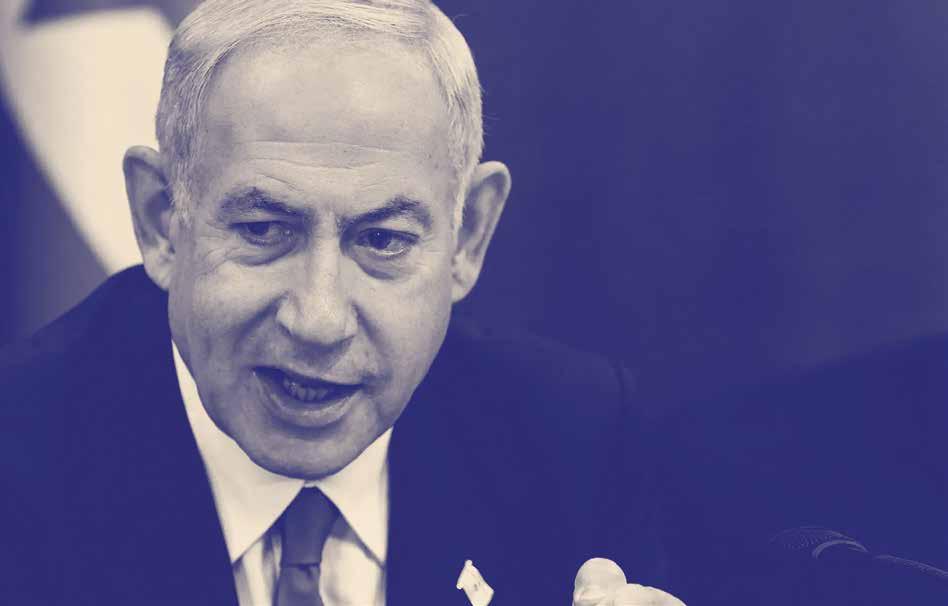
Currently, Israel’s media is laser-focused on the prospect of “the deal” with Hamas. Will “the deal” come to fruition or will Prime Minister Benjamin Netanyahu scuttle it?
The premise of the discourse is that “the deal,” is objectively desirable. Anyone who tells you otherwise – particularly, if his name is Netanyahu – is a liar acting solely out of personal, political and morally corrupt considerations.
The leaders of the security establishment, including Defense Minister Yoav Gallant, Israel Defense Forces’ Chief of General Staff Lt. Gen. Herzi Halevi, Shin Bet director Ronen Bar and Mossad director David Barnea, support “the deal” and insist that Israel can live with the concessions it requires Jerusalem to make to Hamas.
Ahead of a new round of discussions about “the deal” this week in Qatar and Egypt, Netanyahu convened Israel’s negotiating team led by Barnea and Bar on Sunday. Following the meeting, the Prime Minister’s Office published five “red lines” for a deal ahead of the talks.
Broadly, “the deal” involves a six-week ceasefire during which Hamas would release 20 live, predom-

inantly female hostages. Hamas is currently holding around 120 hostages, of whom some 80 are presumed alive. Israel would be required to release hundreds of terrorists from its prisons, including murderers, to secure the release of the 20 women.
Netanyahu’s first red line is for Israel to retain its freedom to resume offensive operations after the sixweek ceasefire. Hamas long demanded that Israel concede that position and agree that the ceasefire would be permanent. Hamas is now willing to give up that demand. But it replaced it with a demand that the U.S. guarantee that Israel will not reinstate military operations in Gaza. Hamas’s reasonable assumption is that Israel will not defy the United States.
Netanyahu’s first red line makes it impossible for the administration to accept Hamas’s demand.
Netanyahu’s second red line requires Hamas to be blocked from smuggling arms from Egypt during the pause in fighting.
His third red line requires a mechanism to ensure that no armed men are able to return to northern Gaza from southern Gaza.
These two red lines come in response to Hamas’s demand that Israel withdraw its forces from the Phil-
adelphi and Netzarim corridors during the six-week ceasefire (which Hamas, and its international supporters, seek to render permanent).
The Philadelphi corridor controls Gaza’s border with Egypt. On Oct. 7, Israel was stunned by the expanse of Hamas’s arsenal and realized that Egypt – far from acting as Israel’s partner in its effort to prevent Hamas from expanding its military power – was enabling it.
Since Israel seized control over the Philadelphi corridor, it has exposed dozens of cross-border underground tunnels. One, in particular, is a massive, three-story highway. Speaking to Amit Segal of Channel 12 news, IDF commanders said on Monday that what Israel has exposed to date is less than half of what Hamas has built yet to discover. So the situation remains threatening, and Egypt is not helping to remedy it – to the contrary.
This brings us to the Netzarim corridor, which IDF forces began constructing several months ago. The Netzarim corridor runs east to west in central Gaza. It enables Israel to control the traffic of Gazans from south to north, as well as prevents Hamas’s reconstitution of its political and military power in northern Gaza by blocking the return of its forces to the area.
Given the strategic significance of corridors, the imperative for Israel to maintain Netanyahu’s red lines is self-evident.
Netanyahu’s fourth red line requires Israel to “maximize the number of living hostages freed during the initial ceasefire.”
Hamas took 250 men, women and children on Oct. 7, and still holds 120 of them nine months later because it rightly views the hostages as its strategic trump card. Since 1985, when Israel agreed to swap Palestinian terrorists for Israeli hostages for the first time, every time that Iran’s terror armies have held Israeli hostages, they have successfully used them to achieve strategic gains.
If Israel removes its forces from Gaza, including from the Netzarim and Philadelphi corridors, and releases hundreds of terrorists from jail to secure the release of 20 hostages, what will it have to give to receive the release of the other 100, including 60 people presumed to still be alive?
Without troops on the ground, without the ability to reinstate combat operations, the cost of negotiating their release would be utterly prohibitive for Israel. As a result, either Israel will capitulate and start the countdown for its destruction to get them released, or it will leave the rest of the hostages in Gaza indefinitely with scant military or diplomatic prospects for their rescue.
Netanyahu’s final red line requires that “the deal” not undermine any of Israel’s war goals. This sounds redundant. But actually, it is important because it includes aspects of the deal that he doesn’t mention explicitly. One of the deal’s components being presented as “pro-Israel” stands out in particular. This component would see an “Arab force” take over security responsibility in Gaza. The idea is that forces from moderate Arab states at peace with Israel would be in charge.
There are two problems with this. First, as has been discovered regarding Egypt, ostensibly moderate and friendly Arab regimes are not necessarily moderate or friendly when it comes to Israel’s war against Hamas specifically or in relation to the Palestinian goal of annihilating Israel more generally. Bringing Arab forces into Gaza effectively merges the existential Palestinian conflict with the all-but-resolved Arab conflict with Israel. Since most Arabs support the Palestinians against Israel, this would undermine the peaceful relations Israel has built with Arab regimes across decades.
Netanyahu’s final red line would reject a deal that in any way undermines Israel’s war goals – and that includes preserving Israel’s peaceful ties with its moderate Arab neighbors.
These red lines need to be viewed as an all-or-nothing package. Either the negotiators secure all of them,
or there is no deal. Their implication is obvious. Israel will accept a hostage deal. Indeed, it is willing to pay a massive price to achieve one. But it will not undermine its position strategically. It will not enable Hamas to win this war. It will not abandon the rest of the hostages. It will not sign its national death warrant. Given the near-unanimous support of the public for the goals of the war, we should pay attention to the actors that have condemned Netanyahu’s red lines. Aside from leftist politicians and activists, who can be expected to condemn him, Netanyahu’s red lines have also been sharply criticized by senior officers in the Mossad and the IDF. Channel 12 quoted two security sources who castigated Netanyahu’s decision to publish his red lines. “Netanyahu pretends that he wants a deal but is working to torpedo it,” one said. That source insisted that Netanyahu was acting for personal reasons.
government’s war goals of defeating Hamas militarily and politically and to preventing the terror group from rebuilding its military and political power.
Halevi’s spokesmen made the case all but explicitly in an interview Monday with ABC News.
“Will you and me be talking five years from now about Hamas as a terror organization in Gaza? The answer is yes,” said Rear Adm. Daniel Hagari, spokesman for the IDF.
A second source of criticism of Netanyahu’s red lines is the Biden administration.
President Joe Biden himself presented the broad outlines of “the deal” last month and insisted that it was Israel’s offer. In intervening weeks, it became clear that Biden was speaking for himself and not for Israel. True, Israel agreed to “the deal.” But it agreed to “the deal” with Netanyahu’s red lines.
Without troops on the ground, without the ability to reinstate combat operations, the cost of negotiating their release would be utterly prohibitive for Israel.
The administration has been pushing full throttle for Netanyahu to accept “the deal” without his deadlines. It is reportedly threatening sanctions against Netanyahu if he rejects it. According to a high-level source, the International Criminal Court’s declared plan to issue international arrest warrants against Netanyahu and Gallant was not an ICC initiative. Rather, it was the brainchild of Maher Bitar, senior National Security Council director for the Defense Department and the Intelligence Community. Bitar, one of the most powerful officials in the administration, is a former UNRWA employee and views Israel as an illegitimate state. He also serves as special counsel to the president. Chatter is now being heard that the White House is threatening Netanyahu, saying the ICC will issue the arrest warrants if he refuses to accept “the deal.”
Rhetoric aside, given the strategic consequences of “the deal,” the administration’s clear position is that it supports Hamas’s victory over Israel in this war.
Netanyahu has long insisted that he is willing to pay an enormous price to achieve the release of the hostages. The fact that he supports “the deal” with his red lines is proof that he is telling the truth. His red lines – minimal as they are – place him on the opposite side of the fence of his detractors. They are willing to accept capitulation. He is not.
A second source insisted that Netanyahu refuses to see the half-full side of the cup. Netanyahu, he said, “emphasizes the gaps” between Hamas and Israel, rather than the agreements they have reached to date. Statements like these and others raise the disconcerting sense that Israel’s General Staff and its other security services reject the government’s decision to fight for victory in the war. Ynet news reported that the generals, including Gallant, believe that securing the release of 20 hostages is more important than maintaining control over the Philadelphi and Netzarim corridors. This means that they aren’t committed to the
The media, the administration and the security establishment refuse to discuss the strategic implications of “the deal,” as proposed, for Israel. Instead, they harshly and hysterically condemn Netanyahu and accuse him of behaving selfishly for refusing to abandon Israel’s war goals.
Given the actual stakes, it is clear that the media is distorting events. Netanyahu is the only actor on the stage who isn’t behaving politically. He is the only one acting to protect Israel from strategic catastrophe.
(JNS)


By Hershel Lieber

I’s not that I had never been in North Carolina before. In the summer of 1985, there was a cheap carrier called People Express Airlines which offered flights from La Guardia to many smaller locations for anywhere between $29 - $49. My friend Motel Bergman and I took two days off from work and went on an overnight trip to Charlotte, North Carolina. I remember going the first day to the Bechtler Museum of Modern Art and driving the next day to Winston-Salem to tour the R.J. Reynolds Tobacco Company. At that time in history, smoking was very common, even though the surgeon general already spoke about the ill effects since 1964. I remember being fascinated by the automation involved in
manufacturing and packaging their Winston and Salem brand cigarettes. The trip was nice but too short, and I always wanted to return to see other cities and places in North Carolina.
The opportunity presented itself in May of 2016, and this time my travel-mate was my wife Pesi. The length of this trip was eight days instead of just an overnight.
We landed in Charlotte late Sunday afternoon and immediately drove westward toward Asheville, a mere two-hour distance away. Other than some food shopping, we did not do anything that day. Monday, we went out to see Asheville. We took a two-hour guided trolly tour which gave us a condensed history lesson about

this vibrant city in the Blue Ridge Mountains. Aside from being an artist colony and a cultural hub, Asheville is acclaimed as a therapeutic center. We ended our tour at the magnificent Grove Park Inn, which overwhelmed us with its opulence. We walked around the lobby and gazed out to the adjoining golf course. When we returned to the city center, we were granted permission to eat our lunches in the lobby of the nearby Haywood Park Hotel. We found a quiet corner with plush club chairs and a coffee table where we were able to dine in leisure. Our next stop was the Grove Arcade, America’s first indoor shopping mall, constructed in 1928. The building ,which occupies a full city block, has presently offices on the second floor

and residential apartments on the next three floors. The first floor is still an arcade with fine stores and diverse restaurants. We walked around and browsed in some of the shops but did not find anything to buy.
Tuesday, we went to see Asheville’s greatest attraction, the Biltmore House. This French Chateau-style mansion, which was completed in 1895, was built for George Vanderbilt, a member of the famed wealthy family. It is still the largest privately owned house in the United States. The 8,000-acre estate has 250 rooms, including lavishly decorated galleries, hallways, ballrooms, dining rooms and a library. The entire area is encircled by forests, and lush formal gardens de -






signed by Frederick Law Olmstead surround the mansion. We spent an entire day there, starting with the gardens and then joining a guided tour that made forty stops within the building. We were told about the decorative features of all the main rooms and were shown highlights of the beautiful furniture, paintings, china, sculptures, tapestries and other objects d’art. It was a mind-boggling experience! Other amenities that were within the mansion were a wine cellar, a humidor, a private screening room, a bowling alley and an indoor swimming pool – a feast for the eyes, but definitely something that neither of us desired.
Wednesday, we drove to Brevard, where we joined a group tour of Pisgah National Park. The tour was labeled as the “Waterfall & Wine Tour,” and we joined four other hikers. Our guide drove us to different sections of the Park which boasted mile-high peaks, cascading waterfalls, and heavily forested slopes. When we left our vehicle, we hiked along the trails to view the magnificent waterfalls, each one possessing unique dimensions and outstanding features. One of the falls spilled out over a humongous, smoothened, inclined boulder where children were sliding with the rushing stream into a pool of water below. After the hike, all participants shared wine and snacks. We explained that we kept a kosher diet and were given bottles of cold water.
Thursday, we headed to the Smoky Mountains. We made a worthwhile stop for an hour at the Asheville Botanical Gardens. The spring flowers had just started to bloom, and the weather was stunning. There was also an exhibition of exquisite, quilted wall hangings which piqued our artistic interest. Then we headed onto the Blue Ridge Parkway which offered panoramic views of the Appalachian Mountains. The speed limit was 45 mph and our drive took about four hours, but it was one of the most enjoyable drives we ever took. We made numerous stops at many overlooks and reached an elevation of over 6,000 feet. We stopped for a picnic
lunch and to stretch our legs and continued to the town of Bryson, the gateway to the Great Smoky Mountains National Park. We had rented a beautiful and very comfortable house perched atop a peak with a spectacular view of the hazy blue mountain range. We would be spending the next four days, including Shabbos, in this natural wonderland. We were thrilled that we would be able to witness the beauty and enjoy the tranquility that this place offered.
Friday, we went to nearby Cherokee, a town on the reservation of the Cherokee Nation. The reservation is home to 15,000 Native Americans of Cherokee descent. We visited the Museum of Chero -
kee Indians where we learned the history of the local Indians who are part of the largest (450,000 strong) group of Native Americans in the United States. We saw many historical artifacts and watched as tribesmen created objects of their ethnic culture. Then we continued on to the Oconaluftee Indian Village which is a replica of an 18th century village. The simple wooden buildings had artisans creating pottery, jewelry, drums, arrowheads, masks, canoe hulling and weaving clothing and baskets. We watched with amazement at their proficiency in archery and in using a blowgun. There was a presentation of traditional dancing accompanied by flutes, drums and rattles. In all, we




learned a lot from these two places about the local natives and somewhat about their culture and history.
Well, Shabbos was Shabbos. We davened, ate our seudos, sang zemiros, caught an afternoon nap, and studied Pirkei Avos together. We learned our seforim and read magazines. We took short walks but had long conversations. We relaxed on the comfortable sofas and sat out on our deck facing the ever-present calm of the lush forest and hazy mountains. We truly experienced the serenity and peace that Shabbos offers.
Sunday was our final day, and we dedicated it to exploring the Great Smoky Mountains National Park. And explore it,
we did! Our car took us to various vantage points within the park where we were able to take in the width and breath of the tree covered mountain range. Our feet took us on a two-and-a-half-mile hike along the Oconaluftee River Walk which combined the pleasure of the streaming river flanking the cool, scented forest trees. We spotted fishermen in the river trying for a catch. At one point during our expedition, we came across The Mountain Farm Museum, a late 19th century mountain farm with authentic log buildings that were moved from original locations throughout the park. Aside from the farmhouse and barn, there was an apple storage house, a spring house which pro -
vided fresh water for the local farmers, and a working blacksmith shop. There were also demonstrations of agricultural practices and livestock tending of that era. Here and there, we spotted deer and elk prancing through the woods. Our day was filled with natural wonder, and we expressed our gratitude to Hashem that we were privy to partake in this delightful experience.
To many people, traveling within the United States does not sound exotic nor exciting. Pesi and I have always felt that there is so much to gain and so much to enjoy within our fifty states. Our trip to North Carolina was just one example that reinforced our sentiments.
Hershel Lieber has been involved in kiruv activities for over 30 years. As a founding member of the Vaad L’Hatzolas Nidchei Yisroel he has traveled with his wife, Pesi, to the Soviet Union during the harsh years of the Communist regimes to advance Yiddishkeit. He has spearheaded a yeshiva in the city of Kishinev that had 12 successful years with many students making Torah their way of life. In Poland, he lectured in the summers at the Ronald S. Lauder Foundation camp for nearly 30 years. He still travels to Warsaw every year – since 1979 – to be the chazzan for Rosh Hashana and Yom Kippur for the Jews there. Together with Pesi, he organized and led trips to Europe on behalf of Gateways and Aish Hatorah for college students finding their paths to Jewish identity. His passion for travel has taken them to many interesting places and afforded them unique experiences. Their open home gave them opportunities to meet and develop relationships with a variety of people. Hershel’s column will appear in The Jewish Home on a bi-weekly basis.




By Eliyahu RosEnBERg
hen Rabbi Lazer Brody was fourteen years old, he wasn’t exactly the healthiest kid on the block. He had vision problems, he wasn’t physically fit, and he frequently fell ill. Always the last of his peers to get picked for the basketball team, Lazer, at age fourteen, had enough and decided that it was time to make a change in his life. Thus, one day, the young teenager put on his sneakers and went out for a run, determined to become healthier. But after running just half a block, he found himself panting and wheezing; his chest had tightened, and he could barely breathe. It soon became evident that he was having an asthma attack.
Most people wouldn’t continue running if they had an experience similar to that, but Lazer Brody’s resolve to become healthier was unwavering, despite the obstacles that lay in his path. The very next day, he donned his running shoes again, left his house even more determined than the day before, and went out for another run around the neighborhood. This time, the boy managed to run three-quarters of a block before another asthma attack stopped him in his tracks. His father took him home, treated him with adrenaline, and gave the boy a stern talking-to for repeating the same “mistake” twice. But nonetheless, Lazer wasn’t the least bit
a nger is a statement that an individual doesn’t like the way hashem is running the world.
if you haven’t been in the israeli army, you can’t understand the amount of hashem’s divine protection on a m yisrael and Eretz yisrael.
We’ve got to be warmed up to serve hashem. What warms us up? Emunah warms our heart, warms our neshamas; emunah lets us feel hashem. a nd how do we get emunah? We get emunah by talking to hashem in our own language.
discouraged. The following day, he ventured outside for the third time, and at last, he successfully ran the length of a full block.
As a young boy, what Rabbi Brody lacked in physical ability, he made up for with the incredible amount of willpower and determination he possessed.
“When I was fourteen, everywhere I went, people were smarter than me and people were stronger than me,” Rabbi Brody recalled. “But Hashem gave me a gift. Hashem gave me a gift of desire, willpower, and ratzon.”
By the time Lazer was fifteen-and-ahalf, he had overcome his asthma, became healthier and stronger, and was fit enough to make it onto his high school’s wrestling team. He accomplished all of that, not with the help of a coach, but by constantly motivating himself to do more. Years later, Rabbi Brody’s unwavering ambition and drive would continue to propel him toward success and happiness – that is, until he found the ultimate joy of Judaism.
* * *
Although Rabbi Lazer Brody didn’t have a religious upbringing, his parents raised him to be a proud and Zionistic Jew. A first-generation American, Rabbi Brody grew up in Washington, D.C., where he attended public school. His mother, as a child, fled to the United States from Poland shortly before the Holocaust broke out, while Rabbi Brody’s father, before immigrating to the U.S., fought against the Nazis in World War II as a Canadian Air Force pilot.
When Rabbi Brody was a child, his father was a successful butcher and the owner of an exclusive grocery store in Chevy Chase, Maryland, a wealthy area where many lawmakers lived.
“When I was growing up, I never felt American,” Rabbi Brody explained. “I always felt Jewish.”
Young Lazer Brody went through the American public school system, feeling disconnected from the country he called home. He was an apathetic American, uninterested in U.S. society. And while his family was living the American dream, young Lazer Brody had a different dream entirely: to move to Israel, serve in the IDF, and become a pioneer farmer. That was the dream that motivated Rabbi Brody to pursue an advanced agricultural products technology degree at the University of Maryland. Ultimately, in 1970, on the day that he graduated from college, Rabbi Brody made aliyah.
By the time 1982 came along, Lazer, who wasn’t yet religious at the time, had fought as an IDF soldier in two wars, including the first Lebanon War, during which he served as a platoon sergeant. It was during an extremely dangerous operation in Beirut that Rabbi Brody had the wake-up call that led him on the path to Yiddishkeit.
“There was no way I was coming out of there alive. And so I made a promise. I said, ‘Hashem, I know that nobody could get me out of here but You. If You get me out of here, I’m going to change my life,’” he recounted. “Men of honor never break their word; it wasn’t foxhole faith. And so, when I got out of
there alive, I went back and I made a little shul in Moshav Mei Ami. When I got home, we had Rosh Hashanah and Yom Kippur.”
All the while, he had been fulfilling his dream of working as a pioneer farmer in Israel. And although Rabbi Brody was always eager to serve in the Israeli army, the timing of his draft in 1982 wasn’t at all in his favor. As it turned out, the draft forced him to be away from his farm for ten weeks during the crucial harvest season.
“When you take a farmer from harvest season and you take him away from his farm, he’s going to lose everything. My oldest son was eleven years old back then, and he was alone with the Arab workers. It was a no-brainer that he was going to get ripped off,” Rabbi Brody recalled.
But strangely enough, the exact opposite occurred. Despite the fact that he had been absent from the farm for the entire harvest season, and was, by all estimations, bound to lose everything, Rabbi Brody somehow ended up making more money that season than ever before. He wasn’t even there, but it was the most successful season of his agricultural career.
The following year, in 1983, several agricultural advisors and officials came to visit Rabbi Brody, who was 34 years old at the time. Upon arriving at the moshav, the people stood in awe of the man’s farm. There was not a weed between Rabbi Brody’s roses, nor between his perfectly shaped trees. But most impressively, his gorgeous orchard grew rare and beautiful Golden King plums – the only plum on the market before Rosh Hashanah. There were no other plums available at the time and people would have, no doubt, loved to make a shehecheyanu on Lazer’s golden plums. By all estimations, the farmer was going to make a great deal of money selling the plums.

“It’s around two, three days before Rosh Hashanah, and I go up to my mountain orchard where that plum section is. It’s 4:30 in the morning, and the pickers are supposed to show up at 5:30. And I’m getting everything ready, getting everything set up, and what do I see?” Rabbi Brody recounted. “My fences are knocked down, there are pickup truck tracks until the fence. From the fence inside there are donkey tracks. And what happened was that Arabs came from Jenin [and stole all the plums]. I was not left with even one peach on a tree for breakfast. I got ripped off the whole crop.
“I just saw Hashem’s hand in my life. This was above nature. The year I should have lost my shirt, I never made so much money. The year I was going to make a killing, I didn’t make a cent,” Rabbi Brody explained. “So I said, ‘That’s it. Hashem, I give up. There’s nothing to do on the farm anymore. And I’m kind of treading water as far as my Yiddishkeit goes. I’m going to go to Yerushalayim to totally immerse myself in Torah.’”
Rabbi Lazer Brody went on to study at Aish HaTorah, received rabbinical ordination from several rabbanim in Yerushalayim, and worked as a prison and military chaplain before becoming an author, inspirational speaker, and accredited fitness trainer. Today, Rabbi Brody, a Melitzer chassid, lives in Ashdod with his wife and has written several books on emunah, a topic that he has dedicated his life to teaching the world about. He also often talks about the importance of being physically healthy, noting that we have an obligation to treat our bodies with respect, as they are holy and ultimately belong not to us but to Hashem.
“We’re all products of hashgacha pratis. It’s just a matter of us opening
This article is based on a podcast, “Inspiration For the Nation,” hosted by Yaakov Langer. To catch more of this conversation, you can watch it on LivingLchaim.com or YouTube.com/LivingLchaim or listen wherever you listen to podcasts (just search for “Inspiration For The Nation”) or call our free hotline: 605-477-2100.
our eyes and seeing that, and that’s what we call spiritual awareness,” Rabbi Brody explained. “Emunah is more than faith; it’s your own personal connection with Hashem. And the more you have emunah, the more you have spiritual awareness, the more you feel Hashem’s hand in your life.”
As Rabbi Brody explains, emunah is the most essential topic in all of Judaism, and yet, in schools and homes, it is often overlooked in the shadow of other important subjects.
“In my view, the problem is that in yeshivas and cheders and Bais Yaakovs, they don’t teach emunah. Girls learn Navi by heart, guys learn tractates of Gemara by heart, kids learn Mishnayos by heart. ‘Hey, kids, why are you doing it?’ ‘Oh, because the rebbi said so,’” Rabbi Brody added. “When there’s emunah, kids know what they’re doing, we know why we’re keeping Shabbos, why we’re eating kosher, we know why we’re dressing properly, and we’ve got smiles on our faces.”
The key to attaining emunah, Rabbi Brody says, is in constantly talking to Hashem in our own language. And to have emunah means that we believe that Hashem is with us at every moment of the day, that He hears all of our prayers, and that He runs the world. And if we believe that Hashem, our merciful Creator, controls everything in the universe, then how can we possibly have any fears or worries? While we may not like the direction the world is moving in, we must remember that, as human beings, we are incapable of understanding our infinite G-d’s master plan. But just as a baby doesn’t need to understand the actions of his or her parents, we too need not understand the deeds of our Heavenly Father. All we need to do is realize that Hashem knows what’s best, and with that belief in mind, we can live our lives with smiles on our faces and eternal peace in our hearts.

Moderated by Jennifer Mann, LCSW of The Navidaters

I have been dating for two years now and have noticed something that I wanted to run past you.
I am the third-to-oldest in my family. We are six siblings in all. My two older siblings are married.
I have noticed a pattern when I go out with boys who are the youngest in their families. These boys – and they were from different backgrounds – all seem to be “mama’s boys” and they seem to have less initiative than other boys I go out with.
I know there is such a thing about “birth order” and certain characteristics that some people say go with people who are oldest or youngest… Have you seen this in your experience? That youngest boys are more coddled and indulged? Maybe I’m reading too much into the “youngests” who I have dated. Or is there something to it, and I should be wary about going out with boys who are the youngest in their families?
What has been your experience with these things?


Rebbetzin Faigie Horowitz, M.S.
What you are saying does sound logical, but I don’t see this often enough to comment. Family culture with a strong work ethic probably can counteract coddling. Youngest children may have witnessed family ups and downs and may be more mature/resilient. I would not generalize about this. I do see, however, that youngest children in medium to large Jewish families tend to have more definite ideas about particular attributes of the people they want to date. In other words, they have watched the young couples in their families and like/dislike aspects of their in-law siblings. They may say, “I want
someone as happy-go-lucky as Leora but with the brains of Batsheva and the creative side of Leah.” Youngests in families seem to have noticed differences and are more familiar with the characteristics that seem attractive to them.
Michelle Mond
Thank you for writing in with this unique question. You are likely a very perceptive person and are therefore picking up on these details regarding the guys you are dating. The concept you are talking about definitely exists. You will often find that a youngest boy within a family will have an extra close

relationship with his parents. You may notice that he talks to his parents about everything, as opposed to an oldest who might be more perceptive to holding it in. Since they have older siblings who took care of a lot in the home, they might be more dependent on family members. It’s not their fault; it’s just the situation they were born into. You cannot make a blanket statement about it, and it also certainly depends on how many children are in the family.
When dating, you can take it at a case-by-case basis. If that is a personality trait that you are sure won’t work for you (i.e. a guy who will often call to ask his mother’s opinion, stop by often on his way home from work, call often, etc.) it is more likely you will see this in the youngests. This personality trait is not limited to only youngests, so don’t think that if you ban all youngest
There is so much more to personality than a person’s birth order.
from your possibilities you’ll be in the all clear.
My advice to you is go out with everybody who seems shayach , despite their birth order. Then be on the lookout while you are dating to see if the young men have these character traits that you

are uncomfortable with. At that point, you can make a decision.
Dr. Jeffrey Galler
The idea that birth order can affect someone’s personality was first in -
troduced a hundred years ago by Alfred Adler, an Austrian psychiatrist. Today, psychologists and sociologists enjoy publishing scholarly articles (and being awarded lucrative research grants) in exploring this issue. Typically, they claim that “Youngest Child Syndrome” manifests as both positive and negative traits.
Positive characteristics: The youngest is described as confident, creative, highly social, charming, funny, and
Dating and Relationship Coaches and Therapists
Thank you for your email. Studies have been conducted regarding personality traits, characteristics, and birth order. Oldest children “tend” to take on more responsibility, while youngests have the rap of being more coddled as you said. I can’t tell you what to do, but ruling out youngest siblings will limit you tremendously. There is so much more to personality than a person’s birth order. My experience with these things, in all honesty, is that when it’s wrong, it won’t work and when it’s right, it will flow.
A few years ago, an acquaintance told me one of the best lines I’ve ever heard: “No flow, no go.” While relationships are full of obstacles and hurdles, the space between the two of you should
feel nice and cozy and peaceful. I doubt these youngest sibling guys haven’t been your bashert because they are the youngest. My money would be on your not having met your guy…yet. Your guy may the oldest, the middle, the youngest – or anywhere in between. Look for kindness, menschlechkeit, someone who cares about your emotional well-being, and is in pain when you are in pain. Who hurts when you hurt. For someone who makes you laugh. For someone whom you do not have to chase. For someone with whom you can just “be.” Not for a birth order.
Best wishes! Jen
Jennifer Mann, LCSW is a licensed psychotherapist and certified trauma healing life coach, as well as a dating and relationship coach working with individuals, couples, and families in private practice at 123 Maple Avenue in Cedarhurst, NY. To set up a consultation or to ask questions, please call 718-908-0512. Visit www.thenavidaters.com for more information. If you would like to submit a dating or relationship question to the panel anonymously, please email JenniferMannLCSW@gmail.com. You can follow The Navidaters on FB and Instagram for dating and relationship advice.
easy-going. (This may be because they need to get attention in a crowded family environment.)
Negative characteristics: They are also described as spoiled, temperamental, irresponsible, and self-centered. My opinion? Not every youngest child fits the “mama’s boy” stereotype, just as not every oldest child fits the “natural leader” or “authority figure” stereotype. Please don’t be insulted when I suggest that it is absolutely nonsensical to try and predict a date’s personality based upon his birth order. Every individual, every family, every human being is predictably unpredictable. Alternatively, perhaps you should check his horoscope? Or see if the gematria of his name bodes good or evil? Or check with a gypsy palm reader? Tarot card fortuneteller? Handwriting analysis?
Every individual, every family, every human being is predictably unpredictable.
I know, I know, I probably sound sarcastic and mean. But there are no shortcuts or easy oversimplifications in dating. There is absolutely no substitute for trusting your own G-d-given common sense and good judgement.

By Sara Rayvych, MSEd
“Rain, rain go away. Come again another day.”
Water is a source of life. We need hydration for our bodies’ survival and irrigation for plants and produce to grow. It’s in our prayers and a source of bracha. What a shame that we often associate rainy days with boredom and misery!
A downpour does limit our options, and we can readily understand why a child may be frustrated to be kept indoors, especially during the warmer months. “Cabin fever” is both real and contagious. Parents, too, may be disappointed. We have so much to get done, and many errands or projects are either hampered or impossible to accomplish when it’s wet outdoors.
Ultimately, we choose our attitude towards the weather. We can either focus on the good or the bad, but whatever we choose is what we teach our children. We can be disappointed by the change to our plans, but still find enjoyment in this wet weather. It’s we who have the opportunity to shape their view, an outlook they will bring with them into the future.
We live in a fast-paced society. We expect results now, if not yesterday. The assumption is that we’re always available, whether by phone, text or email. Two-day shipping is too slow, and fax is inconvenient. Shabbos is a much-needed oasis of peace in a hectic week.
Rain and snow days feel different. They force us to take a step back and slow down our pace. A frustrating inclement weather day can be transformed into a relaxed and calmer one. A cup of tea, coffee or chocolate can be enjoyed beside the window, a book or sefer on the couch.
Kids in the
We are fortunate to have semi-accurate weather forecasts, and we generally have advanced notice of major storms. Often, they predict a massive storm, and we never even get it, disappointing the

children who wanted a day off.
Kids can find the indoors challenging and become very upset when their plans are ruined. To an active child, being kept inside is painful. It’s helpful to have activities or projects prepared for these youngsters.
In addition to keeping kids busy, this is also a natural opportunity to have some family bonding time. With no place to go and fewer distractions, we can be more focused on each other.
There are limitless options, but I’ll provide a few suggestions. Arts and crafts are always popular. The fun part is that pretty much anything can be transformed into a craft project – straws, magazines, used computer paper, string, clean food cartons and anything that you don’t mind getting destroyed. Another amazing aspect to these projects is that kids are happy to do most of the work for you. They’re happy to cut, write or glue whatever you need to have prepared. Keeping a plastic tablecloth under and around their work surface makes cleaning up easier. It’s a good idea to have safety scissors available for small children.
Books are an easy way to relax and enjoy an indoor day. There is something very cozy about curling up with a good book as the wind howls or the raindrops hit the ground. Reading can be an in-
dividual activity or together as a group read-aloud.
Baking and cooking are great activities to do with kids. Cookies are my kids’ dessert of choice, but your child may prefer something different. Preparing dinner can be a family event, enjoying time with each other, as well as teaching children important life skills.
Games and puzzles are a wonderful option. Most games require multiple players and are often more enjoyable as the crowd grows. Puzzles, often thought of as a single player toy, are a lot of fun when done with kids and require lots of conversation and teamwork.
While we may have negative associations with housework, many children will become excited to join their parents and tackle a home improvement or organizational project. Not every task will appeal to every child, but I’ve been pleasantly surprised by the fun we’ve had cleaning out a closet or organizing a space.
Many kids are naturally handy and enjoy putting things together – IKEA is their idea of excitement. They feel accomplished and competent, an emotion they can relive each time they see the item they completed.
Obstacle courses can be designed indoors, as can tents or forts. Legos and other building toys can be used to make larger structures; the beis hamikdash is
a family favorite. Years ago, we invested in a building toy that was small planks, not blocks – Keva and Kapla are two of the popular brands. The kids could spend hours building models much taller than themselves.
Some children will start climbing off the walls whenever they’re feeling stuck inside. Ultimately, kids don’t melt from water. Even though we associate snow – and not rain – with outdoor possibilities, both days can be a fun experience outside. I have surprisingly pleasant memories of putting a popsicle stick in a puddle along the edge of the sidewalk and watching as my “boat” floated down the block. Ensure they are dressed appropriately for the weather, and give them dry clothes when they come in.
You plan, you prep, and your child still wants the rain to go away.
It’s OK to be disappointed. Even when we want to make ruined plans sound like an opportunity, it’s OK for kids to be frustrated when the weather doesn’t cooperate. This, too, is an important lesson for children to learn as they grow up.
It’s only natural that children will encounter situations that don’t go their way and people who won’t cooperate. We can’t – and shouldn’t – shelter them from all disappointment. We can validate their feelings and acknowledge their frustration. Allowing them to experience and deal with these emotions now helps them do the same later when more important issues arise.
While I hope for many happy days of sunshine for our children, we can see the sun and beauty in all weather. Stay hydrated and may we maximize all opportunities for growth. Have a great Shabbos!
Sara Rayvych, MSEd, has her master’s in general and special education. She has been homeschooling for over 10 years in Far Rockaway. She can be contacted at RayvychHomeschool@gmail.com.

Hormones, produced by the endocrine system, are chemical messengers that play an important role in regulating various processes. Hormonal health is crucial because hormones regulate numerous bodily functions like metabolism, reproduction, mood and overall well-being. Our diet can influence hormone production and balance. Understanding how different foods impact hormone levels can help manage health conditions, enhance well-being, and promote overall health. Let’s discuss the role and importance of hormones, foods that have a positive and negative impact on our hormonal health, and other factors that can impact hormone changes.
Hormones are tiny chemical messengers made by glands in our body. They control many important functions like growth, metabolism, mood, and reproduction. Even though they are small and produced in tiny amounts, hormones have a big impact on how our body works. Understanding hormones helps us see how they keep us healthy and balanced. Here are the most important functions that hormones play a role in to keep our health in check:
1. Growth and Development: Growth hormone (GH) is essential for childhood growth, as it stimulates the development of bones and tissues and continues to support tissue and organ maintenance throughout life. GH aids in muscle mass maintenance, cell repair, and metabolic regulation. Thyroid hormones (T3 and T4) are essential for regulating metabolism, determining how quickly the body uses energy, and supporting brain development in children. These hormones also influence cogni -

By Aliza Beer MS, RD, CDN

tive abilities, motor skills, and overall growth, ensuring proper physical and mental health.
2. Metabolism and Energy Balance: Insulin regulates blood glucose levels by facilitating the uptake of glucose into cells for energy production or storage. This process is important for maintaining stable blood sugar levels and providing cells with the energy they need to function. Thyroid hormones also increase the basal metabolic rate, which tells the body how fast it uses energy. This regulation makes sure that our metabolism runs efficiently, affecting overall energy levels and bodily functions.
3. Reproductive Health: Estrogen and progesterone in women regulate the menstrual cycle, support pregnancy, and influence female physical development. In men, testosterone is essential for maintaining healthy energy levels and promoting male physical development.
4. Mood and Cognitive Function: Serotonin influences mood, emo -
tion, and sleep. Dopamine plays a key role in the brain’s reward and pleasure systems, impacting motivation and concentration.
5. Stress Response: Cortisol, known as the stress hormone, helps the body respond to stress by increasing blood sugar levels and promoting brain function and plays a role in fight-orflight situations. Adrenaline (epinephrine) increases heart rate, expands air passages, and maximizes blood flow to muscles, preparing the body for rapid physical activity.
When hormones are not in balance, it can lead to health issues across various systems of the body. This can be seen in metabolic disorders like diabetes or thyroid dysfunction, causing symptoms such as weight fluctuations and fatigue. Reproductive health can be affected, resulting in irregular menstrual cycles, infertility, or physical manifestations like excessive hair growth. Mood swings, anxiety, or depression can occur because
of the disrupted levels of mood-regulating hormones. Sleep disturbances can happen due to fluctuations in melatonin and cortisol, impacting overall energy and daily functioning. Hormonal imbalances also pose risks to bone health, muscle strength, skin condition, and cardiovascular health. Therefore, it is crucial that we take care of our hormonal health! One way we can accomplish this is through our diet.
1. Healthy Fats
a) Avocados: Rich in monounsaturated fats, avocados help reduce inflammation and support hormone production. They also contain beta-sitosterol, which can influence cortisol levels and aid in stress management.
b) Nuts and Seeds: Almonds, flaxseeds, and chia seeds provide essential fatty acids, fiber, and phytoestrogens, which can support balanced hormone levels. Flaxseeds, in particular, contain lignans that can help regulate estrogen levels.
c) Fatty Fish: Salmon, mackerel, and sardines are high in omega-3 fatty acids, which reduce inflammation, support brain health, and help maintain healthy levels of hormones such as insulin and cortisol.
2. Cruciferous vegetables: Broccoli, kale, and Brussels sprouts are high in fiber and contain indole-3-carbinol, which aids in the metabolism of estrogen and supports liver function.
3. Whole Grains: Oats, quinoa, and brown rice are complex carbohydrates that help stabilize blood sugar levels, which can balance insulin and other hormones. They also provide es -
sential B vitamins that are needed for hormone production.
4. Lean Meats and Poultry: Chicken, turkey, and lean cuts of beef provide amino acids necessary for hormone production and maintaining muscle mass. They also contain zinc, which is crucial for reproductive health.
5. Legumes : Beans, lentils, and chickpeas are great plant-based protein sources that support hormone regulation. They are also high in fiber and can help manage blood sugar levels, which is important for insulin balance.
6. Berries: Blueberries, strawberries, and raspberries are high in antioxidants such as vitamin C and flavonoids, which protect the endocrine system from oxidative stress and support immune function
7. Dark Chocolate: Contains flavonoids that improve insulin sensitivity, reduce stress hormones, and provide magnesium, which is essential for hormone production.
for Hunger and Satiety
Hormones play a large role in regulating hunger and satiety. Ghrelin, which stimulates hunger, and leptin, which promotes satiety, are two examples. Here are some ways certain foods and nutrients can influence these hormones and help in managing hunger and increasing satiety:
1. Protein-Rich Foods
a) Examples: Lean meats, fish, eggs, dairy products, and legumes,
b) Effect: Protein increases the release of hormones like peptide YY (PYY) and GLP-1, which promote satiety and reduce levels of the hunger hormone ghrelin.
2. Fiber-Rich Foods
a) Examples: Vegetables, fruits, whole grains, legumes, and nuts.
b) Effect: Fiber slows down digestion, increases the production of satiety hormones, and helps maintain stable blood sugar levels, reducing hunger.
3. Healthy Fats
a) Examples: Avocados, nuts, seeds, olive oil, and fatty fish.
b) Effect: Healthy fats can increase the release of satiety hormones and help you feel full longer.
4. Water and Hydration
a) Examples: Drinking water, herbal teas, and eating water-rich foods like cucumbers and watermelon
b) Effect: Staying hydrated can reduce hunger and increase satiety.
a) Examples: Whole grains, legumes, non-starchy vegetables, and most fruits.
b) Effect: These foods cause a slower, more gradual rise in blood sugar and insulin levels, which can help control hunger.
6. Fermented Foods
a) Examples: Yogurt, kefir, sauerkraut, kimchi, and other probiotic-rich foods.
b) Effect: Fermented foods can improve gut health, which is linked to better regulation of hunger and satiety hormones.
1. Refined Sugars: High sugar intake can lead to insulin resistance, which disrupts the balance of other hormones such as leptin (which controls hunger) and ghrelin (which regulates appetite).
2. Trans Fats: Found in fried foods, margarine, and baked goods, trans fats can interfere with hormone function, increase inflammation, and negatively affect cholesterol levels.
3. Caffeine: Excessive caffeine consumption can elevate cortisol levels, leading to chronic stress and disrupted sleep patterns, which further impact hormone balance.
4. Alcohol: Can disrupt the balance of reproductive hormones such as estrogen and testosterone, impair liver function (which is essential for hormone metabolism), and negatively affect the adrenal glands.
1. Stress: Chronic stress leads to elevated cortisol levels, which can suppress the production of other essential hormones such as thyroid hormones and reproductive hormones. High cortisol levels can also interfere with sleep, metabolism, and immune function.
2. Lack of Sleep: Poor sleep quality and insufficient sleep can disrupt the release of growth hormone, insulin, and cortisol, affecting overall hormonal balance. The body’s circadian rhythm, which regulates hormone release, can be significantly impacted by irregular sleep patterns.
3. Physical Activity: Exercising regularly helps regulate hormones like insulin, cortisol, and endorphins. Moderate exercise supports a healthy balance, but excessive exercise can lead
to increased cortisol levels and disrupt reproductive hormones such as estrogen and testosterone.
4. Chemical Exposure: Exposure to chemicals such as pesticides, plastics (BPA), and heavy metals can mimic or block hormone action, leading to imbalances. These endocrine disruptors can interfere with the normal functioning of the thyroid, adrenal glands, and reproductive organs.
5. Age: Hormone levels naturally change with age, with significant shifts occurring during puberty, pregnancy, and menopause/andropause. Genetic factors can influence how your body produces and responds to hormones, affecting overall hormone balance.
Soy contains high levels of isoflavones, a plant estrogen, that is similar in function to human estrogen. Since soy is able to act like estrogen and influence hormonal health, there might be possible benefits and risks when consuming soy. Potential benefits include improving menopausal symptoms like hot flashes, bone health in menopausal women, and reducing cholesterol levels to improve heart health. Some studies report possible negative effects of soy products on hormonal health. These potential risks include interference with thyroid hormones, leading to hypothyroidism, inhibit absorption of certain minerals, and endocrine disruption. For girls and young women, there have been studies that suggest that excessive consumption of soy might affect the menstrual cycle and cause irregularities. Evidence on fertility is mixed – while some animal studies have suggested that high soy intake could affect fertility, human studies are less conclusive. Overall, moderate soy consumption is generally not considered harmful.
The effects of soy on hormonal health depend on various factors, including the amount and form consumed, individual genetic factors, and life stage. Consuming soy in moderate amounts is generally safe and beneficial if you choose whole soy foods like tofu, tempeh, edamame, and soy milk being preferable to highly processed soy products. Genetic differences affect how people process phytoestrogens, with those from cultures that traditionally eat soy potentially metabolizing it better. This means that people with a long history of soy consumption in their diet may have developed a better ability to break down and utilize isoflavones, the active compounds in soy. The impact of
soy also varies by age since postmenopausal women may benefit more from its estrogen-like effects for relieving menopausal symptoms and supporting bone density, while younger individuals may see less pronounced effects.
If you’re looking for meal ideas that support your hormonal health, check out this meal plan that can benefit the whole family!
1. Breakfast
a) Avocado toast on whole-grain bread, and a sunny side-up egg with a sprinkle of flaxseeds
b) Oatmeal with chia seeds, almond butter, and berries
2. Lunch:
a) Pesto baked salmon over a salad with mixed greens, cherry tomatoes, cucumber, slivered almonds, and a drizzle of olive oil
b) Lentil soup with a side of mixed greens salad and whole grain bread
3. Dinner
a) Grilled chicken breast with sweet potatoes and broccoli
b) Baked mackerel with a side of air-fried Brussels sprouts and cauliflower rice
Hormones play an important role in regulating various physiological processes, including metabolism, reproduction, mood, and overall well-being. Maintaining hormonal health is essential as imbalances can lead to a range of health issues. Diabetes, thyroid dysfunction, obesity, mood swings and reproductive problems are a few of the negative health consequences hormone imbalance can bring. Our diet can have a significant impact on hormone production and balance, with certain foods supporting healthy hormone levels while others can disrupt them. By understanding the impact of different foods on our hormones, you can make informed dietary choices that enhance your well-being and promote overall health. A balanced diet rich in healthy fats, whole grains, lean proteins, and vegetables, combined with proper sleep, stress management, and physical activity, can help maintain optimal hormonal health.
Aliza Beer is a registered dietitian with a master’s degree in nutrition. She has a private practice in Cedarhurst, NY. Patients’ success has been featured on the Dr. Oz show. Aliza can be reached at alizabeer@gmail. com, and you can follow her on Instagram at @alizabeer

By Naomi Nachman
I made this chicken recipe as a collaborative project for my show Sunny Side Up on Kosher.com with Celeste Hackel and Jen K – yes, the jewelry – hence, the title of the recipe. I love the clean, fresh ingredients and simplicity of how the recipe comes together.
◦ 32 ounces frozen bag brussels sprouts
◦ 2 red onions, cut in chunks
◦ 3 large sweet potatoes, cut into chunks
◦ 10 chicken thighs
◦ 3 tablespoons truffle honey or your favorite flavored honey
◦ 2 tablespoons balsamic vinegar
◦ Olive oil
◦ Paprika
◦ 3 blood oranges, sliced
◦ Salt, to taste
◦ Black pepper, onion powder

1. Preheat oven to 375°F. Spray the bottom of an 18x13-inch sheet pan.
2. Lay vegetables in a single layer. Drizzle olive oil and season with sea salt, pepper, and onion powder to taste.
3. Place chicken over vegetables. Sprinkle salt and paprika over the chicken.
4. In a small bowl, whisk together honey and balsamic vinegar. Drizzle over chicken and vegetables and smear onto the chicken skin to coat with flavor.
5. Place in oven, uncovered, for one hour. Remove from oven and place an orange slice over each thigh. Return to oven for 45 minutes or until browned and ready.
Notes: In order to properly inspect brussels sprouts for any kind of infestation, they must be taken apart completely, which is why only those sold with a reliable hechsher (primarily) frozen are recommended for use.
Naomi Nachman, the owner of The Aussie Gourmet, caters weekly and Shabbat/ Yom Tov meals for families and individuals within The Five Towns and neighboring communities, with a specialty in Pesach catering. Naomi is a contributing editor to this paper and also produces and hosts her own weekly radio show on the Nachum Segal Network stream called “A Table for Two with Naomi Nachman.” Naomi gives cooking presentations for organizations and private groups throughout the New York/New Jersey Metropolitan area. In addition, Naomi has been a guest host on the QVC TV network and has been featured in cookbooks, magazines as well as other media covering topics related to cuisine preparation and personal chefs. To obtain additional recipes, join The Aussie Gourmet on Facebook or visit Naomi’s blog. Naomi can be reached through her website, www.theaussiegourmet.com or at (516) 295-9669.



By Nati Burnside
Great Neck isn’t often a location I get asked much about. In case you are not familiar with the geography, it’s on the northern edge of Long Island, kind of near the border with Queens. It’s on a little peninsula that sticks out to the north, but not one that is connected by a bridge or a tunnel to The Bronx. In fact, if you are trying to get to today’s restaurant, it’s north of Northern Boulevard.
That said, few people ever just “pass through” Great Neck looking for a place to eat. But that doesn’t mean that the food there isn’t great. I was very pleasantly surprised by NOIR, a local, family-owned restaurant that is one of the community’s high-end fleishig options.
The same owners are also the proprietors of the popular NOIR Bakery & Cafe. Open for about six years, it’s become a community staple, and when the space next door became available, the owners decided it was time for Great Neck to be able to fill the need that people had usually been commuting to Queens or the Five Towns for.
The result is a minimalist, sleek, trendy spot. It features a partially open kitchen, giant vaulted ceilings, and a good amount of outdoor seating out front.
When I was invited to NOIR, the first thing that I noticed about the menu was that there were plenty of fish options. I guess I shouldn’t have been surprised given that this is Great Neck and Persian Jews are known for their love of fish. In the “small bites” section of the menu, I’d recommend getting the Smoked Trout Crostini. Available for purchase by the piece (very helpful), this was a toasted challah crostini topped with smoked trout, dill, lime aioli, and rose petals. Not only did it look delicious, but it offered a really composed bite. The smokiness of the fish went well with the dill and rose petals, while the lime aioli
provided just enough bite to balance everything out.
Looking at the “for the table” part of the menu, there are so many great options to choose from. The Lamb Chops may have been the best of their kind I have had in a long time. Marinated in miso and sesame and topped with tiny cubes of chili, I loved the flavor profile here. With a salty and savory base combined with a slightly spicy topping (no seeds, so not very spicy), this may have been the best bite of the entire night.
While there are a few salads on the menu, I would encourage the salad seekers to do something else instead. If you order the Popcorn Fish, you’ll see that it comes on top of a mesclun mix salad with red onion and slivered celery. The salad itself is pretty good, but the cubes of tempura fried grouper steal the show here. Grouper isn’t found regularly on kosher restaurant menus, so you may not have had it before, but it’s a fairly lean white fish that is slightly sweet (almost like black sea bass). Each of the bites of grouper will make you want the next. The outside is super crispy with the inside being flaky and tasty. Getting some of the salad on your fork at the same time is a real delight.
For main courses, you have plenty of choices. If it’s beef you are looking for, order the Hangar Steak Skewer. A visually striking dish, the skewer is topped with a green salsa and served overtop a bed of charred broccoli rabe that is sitting in a pool of lemongrass and cherry tomato reduction. I loved everything about this dish. The broccoli rabe was crispy (even sitting in the reduction), and the meat was a great base for the double acidity of the reduction and the salsa. To be fair, I would have been happy dredging almost anything in that reduction.
Speaking of red sauces, the Moroccan Fish is the way to go if you are try-



ing to take advantage of your location in Great Neck. With a tomato sauce base, the fish is served with red peppers, fingerling potatoes, chickpeas, and fresh herbs. Not only is the fish super delicate and flaky, but it is elevated by absorbing some of the flavor of the sauce. The red peppers make the sauce a bit spicy, the potatoes remain crispy, and the chickpeas add a textural element as well.
If you have room for dessert, try the Shaved Pineapple. With an array of butterflied pineapple slices arranged like tents across the plate, it’s easy to grab a slice, a little bit of the vanilla ice cream,



and some of the lemon cookie crumble at the same time. The mouthfeel is perfect with the crunchiness of the crumble complementing the classic fruit and ice cream pairing well. It’s light, sweet, and a perfect ending to a great meal.
One last thing to keep in mind is that the menu changes a little more frequently here than other eateries. Many of the patrons are regulars, leading the chef to change the menu to keep everyone coming back.
Even if you aren’t a regular, stop into NOIR and enjoy the flavors Great Neck has to offer. It might be off the beaten path, but it can also be a destination if you make it one.
This column features business insights from a recent “Mind Your Business with Yitzchok Saftlas” radio show. The weekly “Mind Your Business” show – broadcasting since 2015 –features interviews with Fortune 500 executives, business leaders and marketing gurus. Prominent guests include John Sculley, former CEO of Apple and Pepsi; Dick Schulze, founder and Chairman Emeritus of Best Buy; and Beth Comstock, former Vice Chair of GE; among over 400+ senior-level executives and business celebrities. Yitzchok Saftlas, president of Bottom Line Marketing Group, hosts the

weekly “Mind Your Business” show, which airs at 10pm every Sunday night on 710 WOR and throughout America on the iHeartRadio Network.
Since 2015, Yitzchok Saftlas has been speaking with leading industry experts on the “Mind Your Business” show, sharing insightful business and marketing strategies.
In this article, we’ve gathered tips from five business leaders on how to expertly negotiate and close on a sale.
Ted Miller iii, ceo of Training Mastery 3
The Training Mastery 3 ascension sales process allows you to shorten the sales cycle and achieve success quickly. It’s all about collapsing time by looking at how fast you can offer the best thing that you have to your ideal prospective clients. I’ve seen a trend of people saying, “Let’s lead with our biggest offers, high-ticket closers.” Let’s say that offer costs $25,000. The way they execute this idea feels almost like they’re having their salespeople calling up prospects and leading with, “Hi, nice to meet you. Do you have $25,000?” They might not know you, like you, or trust you enough yet to want to spend that much money. You first have to find a way to engage with your prospective clients and use AIs (Authentic Interactions). That allows you to connect with people in short order. You come into their world, maybe by doing a small, 2-hour workshop for $250. But, in that short period of time, you are able to get some heavy-lifting work done and create an AI with the client. Invert your approach. Don’t go from a $10 offer, to the hundreds, and then the thousands. Find a way where you can have an AI, and once they’ve seen what you’re made of, then share the best way you can serve them. Now, you can offer your high-ticket solution, and from there, you can share the smaller solutions. What you’ve done is allow the client to get started where they’re most comfortable. You can’t dictate or control where people are at. So, you meet them where they’re at and help them get closer to where they want to be.

l ook Beyond T he n u MBers
r ichard s olomon, noted Attorney
The truth is that no matter what kind of deal you’re trying to negotiate, the numbers coming from either side, ultimately, have emotions attached. When you throw out a starting number, it can force you to dig your heels in until there is no room left for compromise. Those numbers can become flashpoints that must be met, and as soon as one side of the negotiation starts to go below or above those numbers, people on the other side will get agitated, and that agitation will often lead to anger. That’s when what was once a nuanced negotiation can sometimes turn into more of a blind tug-of-war that causes everything to fall apart. So, instead of focusing on the numbers, try to take a step back. Look at the bigger picture and the underlying interests of both parties. By doing so, you can avoid getting stuck in a win/lose mentality and instead find creative solutions that will satisfy everyone’s needs.
Here’s the biggest

that most good salespeople and negotiators know: listen, listen, listen.
hAve A s cri PT
d ean harder, Founder of h
In the world of sales, there tends to be a negative connotation with scripting. And yet, in all of my career, every sale I’ve made has been scripted. But it’s not manipulative scripting. What I’m trying to do, more than anything, is to make you recognize that I’m on your side of the table. I’m not here trying to force a sale on you. I’m not trying to hit some kind of a sales quota. I’m here to help you get something you want. And if you come to realize that what you’re doing is not going to provide the outcome that you’re after, I’m no longer convincing you or persuading you. Instead, you’re compelling yourself to go, “Holy cow! I’m standing in the fork of the road, and if I stay on the path I’m on, I’m not going to experience what I want. So, Dean, what else could I do?” We don’t pitch people; we have conversations. When somebody comes to a point where they want to own something, or they want to implement something, and it just so happens that we can help them do that, they’re not being sold something, they’re choosing to buy. We go out, every single day, buying things that we want: a cup of coffee, gas, a carwash, dry cleaning, etc. We don’t do that just because we want to blow money. We do that because we want the outcome those things give us. When it comes to the world of sales, especially when it comes to building relationships, we become the conduit to help that person get to a point where they can recognize, first and foremost, that they need to change course to reach those outcomes.

Be Pre PA red
Greg Williams, Master negotiator and Body l anguage e xpert
Before you walk into any negotiation, you need to be prepared. Do background gathering of information about the person or entity with whom you are actually going to be negotiating with. Part of that background information you should be gathering is the personality type of that individual or entity. You do not use the same negotiation strategies in one situation that you might use in another, simply because the personality types might be different. You also want to know what is important to that person when considering why they would even listen to you. What challenges are they trying to achieve by possibly bringing you or your services in, as opposed to your competition? With that background information, you can set the foundation for which you will present yourself, or use it to create alternate strategies, if at any point during the conversation you’re not on the path you thought you’d be on.
Now, here’s the biggest key that most good salespeople and negotiators know: listen, listen, listen. That doesn’t just mean listening with your ears, it also means listening with your eyes. You need to observe what’s actually occurring in the room.

GoinG F roM 1-10
Adam l ieberman, President of l ieberman Training
Whenever anyone is trying to break into sales as a career, the hardest thing to do is almost always getting their first account. Once you get that first account, the next nine will usually be a lot easier. So, the most important thing for anyone trying to make a deal is to convince anybody into just placing one small order. Once they’ve done that, that first-sale barrier is shattered. Even if it’s just a $1 sale. The fact is, once they place an order and receive something from you, a connection has been made. Now, if you’re trying to get a customer to engage with you and they say, “I’m currently dealing with somebody else.” You can respond, “I understand that, and I’m not looking for any business that I don’t deserve. But, times are very tricky, and at a moment’s notice, you may need somebody else. I want to give you a chance to engage with me. Give me one chance to get you just a sample of what we offer. You can always increase that if that’s your desire. But, from your perspective, there’s nothing more valuable than having a backup supplier or service that can give you what you need. And the best way to do that is to start right now. At a moment’s notice, we can give you anything you need down the road.”


Well sure but I was doing a … lot of other things, like wars around the world.
- Pres. Biden when asked by ABC News anchor George Stephanopoulos why he hasn’t been challenging Trump’s “lies” over the past few months
I’m the guy that shut Putin down. No one thought that could happen.
- Ibid.
I’ll feel as long as I gave it my all and did the goodest job I know I could do.
- Ibid., when asked how he would feel if he loses to Trump
The fact of the matter is, how can you assure you’re going to be on — on, you know — on your way to go to, you know, work tomorrow? Age — age wasn’t, you know, the idea that I’m too old.
- Ibid.
Keep in mind, that sound bite is supposed to be reassuring to those Democratic supporters who have gone wobbly.
- Jake Tapper, CNN, talking about the above quote
There are certain immutable facts of life, and those were painfully obvious on that debate stage, and the president just doesn’t seem to come to — he hasn’t come to grips with it. He’s not winning this race.
- David Axelrod, a senior adviser in the Obama administration, on CNN’s “Inside Politics” calling on Pres. Biden to bow out of the race
If you just look at the data and talk to people around the country, political people around the country, it’s more likely that he’ll lose by a landslide than win narrowly this race. And if the stakes are as large as he says, and I believe they are, then he really needs to consider what the right thing to do here is.
- Ibid.
Nothing is for granted in this life. We all learned this firsthand in the past year. This land, the people on it, the feeling of security, sunrise, sunset, the excitement of a mother for her son walking a few meters at the age of 35.
- Israeli singer-songwriter and Fauda star Idan Amedi, who was seriously wounded in battle in Gaza, in footage on Tuesday from rehab
Why are you littering?
I am lazy.
I don’t care about natural areas.
Mommy still cleans up after me.
All of the above.
- One of the signs that is part of Babylon Long Island’s effort to stop people from littering

Did you notice how the names of all of Israel’s enemies start with H? Hamas, Hezbollah, Houthis, Ha’aretz…
- Tweet by Uri Kurlianchik
I could have diagnosed him from across the mall.
- Dr. Tom Pitts, a board-certified neurologist, telling NBC News that President Joe Biden is displaying symptoms of Parkinson’s
It would be better for the state attorney to remember that he is the attorney of the State of Israel, and not of its enemies.
- National Security Minister Itamar Ben Gvir lashing out at State Prosecutor Amit Aisman who is investigating three heroic civilians who ran into the line of fire on October 7 and saved many lives who are now being accused of “murdering” one of those sick and evil terrorists
May he continue to have fun on his yachts. I prefer to work.
- Elon Musk, on X, responding to a video of Mark Zuckerberg surfing on July 4 in a tuxedo, while holding a an American flag and drinking a beer
I have the answer to the Crooked Joe Biden Incompetence Puzzle — Let’s do another Debate, but this time, no holds barred – An all on discussion, with just the two of us on stage, talking about the future of our Country. The ratings were massive for the First Debate, record setting, in fact, but this one, because of the format, would blow everything away!
- Social media post by Trump
Likewise it would be yet another test for me. What a great evening it would be, just the two of us, one on one, in a good, old fashioned Debate, the way they used to be. ANYTIME, ANYWHERE, ANYPLACE!!!
- Ibid.

In recent weeks, Iranian government actors have sought to opportunistically take advantage of ongoing protests regarding the war in Gaza, using a playbook we’ve seen other actors use over the years.
- Director of National Intelligence Avril Haines
We have observed actors tied to Iran’s government posing as activists online, seeking to encourage protests and even providing financial support to protesters.
- Ibid.

The media didn’t panic because they saw Biden [at the debate]; they panicked because YOU saw it.
– Greg Gutfeld, Fox News
Democrats in Congress are reportedly trying to find the best way for Biden to “move forward,” which is probably with one of those walkers with the tennis balls on the bottom of them.
- Kathryn Hahn, guest host of “Jimmy Kimmel Live”
There’s a concept in Judaism called lashon hara, which is translated into, quite literally, evil speech. The idea is that speaking poorly of another is almost the moral equivalent to murder because you can’t really repair it. You can apologize, but you can’t repair it. Another component of that is that it does as much damage to the person saying the words than it does to the person receiving them. And I think about that a lot. I talk about this concept with my kids a lot, and I’m not willing to pay the price of that fleeting and momentary satisfaction of sort of swinging back because I think it would be too expensive for my soul.
– Ivanka Trump on the Lexi Friedman podcast explaining why she didn’t respond to the many vicious critics that she had during the Trump presidency
He is not a pleasant person to be around when he’s being briefed. It’s very difficult, and people are scared … of him.
- An unnamed senior Biden administration official disclosing to Politico – now that the normally left wing press turned on Biden –that Pres. Biden is difficult to be around
By the way, I’m proud to be, as I said, the first vice president, first black woman, to serve with a black president.
- President Joe Biden in a radio interview with Philadelphia’s WURD

Walk around San Francisco. It is not America anymore. It just isn’t. What a wasteland. All of these places shutting down. It is not a partisan argument. When a Walgreens shuts down and a drug store shuts down and a convenience store shuts down, a bodega shuts down, that’s nothing to do with whether you’re blue or red.
– “Shark Tank” star Kevin O’Leary

By Michelle Goldberg

Though Joe Biden’s debate performance last week was among the most painful things I’ve ever witnessed, it at least seemed to offer clarity. Suddenly, even many people who love this president realized that his campaign has become untenable.
For years, loyal Democrats have been suppressing their private anxiety about Biden’s decline. In the debate’s miserable aftermath, there was finally space to acknowledge the obvious: Biden is too old for this. “Not everything that is faced can be changed, but nothing can be changed until it is faced,” James Baldwin wrote. The Democratic Party’s predicament is an awful one, but there was a cold, flinty relief in being forced to reckon with it.
Since then, however, the Biden campaign has quickly moved to squash that reckoning, framing the divide in the Democratic Party as one between naive, hysterical outsiders and savvy, resolute insiders. Biden surrogates fanned out to discount the debate as a single “bad night.” A campaign email slammed those calling on the president to step
aside as the “bed-wetting brigade,” and offered tips for responding to “your panicked aunt, your MAGA uncle, or some self-important podcasters,” an apparent reference to the former Obama officials who host “Pod Save America.” On Monday, I listened to a recording of a Zoom meeting with Biden’s national finance committee in which his deputy campaign manager, Quentin Fulks, accused the media of blowing the debate “out of proportion,” and his campaign manager, Jen O’Malley Dillon, compared it to Barack Obama’s lackluster performance against Mitt Romney in 2012.
Some allies of the president have even suggested that Democrats learn from Donald Trump’s unswerving followers. “If Republicans are standing lock step” with the 78-year-old disgraced criminal Trump, said MSNBC host Jonathan Capehart, “then Democrats [darn] well should be standing lock step with their ethical and morally decent 81-year-old president.”
I don’t blame people in the Biden camp for doing everything they can to tamp down an intraparty revolt. That’s
their job, and I take some comfort that they’re doing it as well as is possible, since if Biden is the nominee, it’s imperative that he defeats Trump. But as long as there’s time to replace Biden, Democrats should not allow themselves to be bullied into fatalism and complacency.
More than a setback, Biden’s showing at the debate was a revelation, confirming the worst fears of his doubters. Since then, several news reports have made it clear that the Biden we all saw onstage is familiar to those who see him behind the scenes. Axios reported that, according to presidential aides, Biden is alert and engaged from 10 a.m. to 4 p.m., but not necessarily outside those hours. The Wall Street Journal reported that European officials were worried about Biden’s “focus and stamina” even before the debate, “with some senior diplomats saying they had tracked a noticeable deterioration in the president’s faculties in meetings since last summer.” This is not a fixable problem.
Since Thursday, there’s been talk among Democrats of a comeback. “When you get knocked down, you get
back up,” Biden said at a boisterous rally Friday in North Carolina, words that are now part of a new campaign ad. The progressive Democratic Rep. Ro Khanna, a Biden surrogate, likened the president to the fictional boxer Rocky Balboa. But as should be evident, aging cannot be overcome with grit.
I’ve heard hopeful Democrats enthuse about how much better Biden was in North Carolina than he’d been the day before at the debate, but that’s silly: We all know Biden is usually fine reading from a teleprompter. The question is whether he can think and speak extemporaneously, a low bar for a president and one that Biden can no longer be relied on to clear. After all, if Thursday were just a bad night, he could reassure doubters by doing a bunch of interviews and unscripted town halls. If he’s not doing that, it’s probably because his campaign doesn’t think he can pull it off. It should go without saying that Biden in any condition is preferable to Trump, especially after the sinister Supreme Court ruling Monday granting presidents immunity for their official
acts, an act of civic desecration all but ensuring that a second-term Trump would rule as a vengeful dictator. The stakes of this election are existential; it’s a referendum on whether America will continue to be a liberal democracy. Everyone in the anti-Trump coalition is scared, which is why the argument over what to do about Biden is so heated.
But asking Democrats to show MAGA-style devotion to their leader is a dubious strategy both ethically and practically. There is nothing to admire in the way Republicans have fallen in line behind Trump; it’s been a moral catastrophe and has left their party a hollow shell that keeps losing winnable races. To pretend that Trump is fit for public office, Republicans have had to give themselves over to corrosive denial. If Democrats spend the next four months — and then, in a best-case scenario, the next four years — telling people not to believe their own eyes about Biden, it will come at great cost to their credibility.
Now, it would be worth it for the party to set its credibility on fire to keep Trump out of the White House. But even before Thursday, Biden was losing, and
though it’s too early for much reliable post-debate polling, there are already ominous signs.
In data guru Nate Silver’s polling averages, Trump leads by 2.4 percentage points, and Silver wrote that he’s seeing “the beginnings of a tangible effect from the debate on our forecast.” After
lead fell by 8 points. On the national finance committee call, campaign pollster Molly Murphy acknowledged that fallout from the debate is also showing up in internal polls.
Some who believe that Democrats should stick with Biden argue that Vice President Kamala Harris would be even
As long as there’s time to replace Biden, Democrats should not allow themselves to be bullied into fatalism and complacency.
the debate, the Democratic polling firm Data for Progress asked voters if they were more concerned about Biden’s age and health, or Trump’s criminal charges and threats to democracy. By 11 points, they said they were more worried about Biden. Democratic pollster Stan Greenberg surveyed a group of Democratic-leaning voters both before and after the debate, and found that Biden’s vote

weaker and that the idea of finding a new nominee at an open convention is an airy fantasy out of Aaron Sorkin’s “The West Wing.” But there’s nothing sober or serious about resigning ourselves to our current disastrous trajectory when viable alternatives still exist.
The Data for Progress poll shows Harris performing exactly as well — or as poorly — against Trump as Biden
does, losing to him by 3 points, and unlike Biden, she could campaign vigorously to change people’s minds. Asked who is “fit to run the country,” voters give Trump a 14-point lead over Biden, but only a 3-point lead over Harris. The poll also tests seven lesser-known Democrats against Trump, and shows each of them within 2 or 3 points of the ex-president, though with more voters undecided, suggesting these Democrats could have room to grow.
Finding a Biden alternative would be risky and messy, and there’s no guarantee that it would work better than trying to put on a brave face and drag the current president across the finish line. But the Democratic Party’s leaders — the people, let’s remember, who got us into this mess — have no right to condescend to those trying to find a way out.
James Clyburn, the influential Democratic representative from South Carolina, said Friday that Biden should “stay the course.” Given the course we’re on, that is ridiculous advice. If you’re in a car careening toward a cliff and can open a door, you should jump out.
© The New York Times


Next week’s 75th anniversary celebration of NATO was planned in part as a triumphal valedictory for President Biden. The 31 other members would celebrate his leadership in rebuilding and expanding the alliance and in standing firm with Ukraine.
But that was before Biden’s dismal performance in last week’s debate. Now, says one senior administration official who had been involved in the planning, the NATO summit will be a moment of trepidation and peril. Every European eye will be on Biden, wondering whether he can recover physically and politically.
If Biden withdraws from the presidential campaign by next week, NATO leaders will give him a heartfelt pat on the back – even as they nervously eye the polls. A Donald Trump victory, many Europeans fear, could separate the United States from its European allies. What NATO touts as the world’s most successful military alliance would be adrift in stormy seas.
“The summit has gone from an orchestrated spectacle to one of the most anxious gatherings in modern times,” said the official, who requested anonymity to speak frankly about issues surrounding Biden that have transfixed Washington and the world.
The quiet concern among top national-security officials over the past week has been that a foreign adversary might seek to exploit a moment when the commander in chief is in political limbo and his administration is distracted. The two potential troublemakers that most concern U.S. officials are Russia and North Korea.
U.S. officials don’t see any imminent crisis. But it’s a fact that Russia and the United States have been moving up the escalatory ladder in Ukraine in recent months. Biden crossed two previous “red lines” when he approved shipment of
By David Ignatius

ATACMS long-range missiles this spring and then authorized the use of such U.S. weapons inside Russian territory.
Russia has responded with a little-reported wave of sabotage attacks in NATO countries, striking at facilities that distribute weapons to Ukraine, but strikes on targets inside America haven’t been reported so far.
Strikes on targets inside America haven’t been reported so far. But a sign of vulnerability came with a reported explosion Wednesday at a General Dynamics defense plant in Arkansas that produces Javelin and Hellfire missiles, both used in Ukraine. At least two people were injured, according to the Associated Press. An official with the Department of Homeland Security told me law enforcement officials are gathering information about the incident.
North Korea is another wild card.
Russian President Vladimir Putin visited Pyongyang last month and announced a “breakthrough” partnership in which
each country pledged to defend the other. Some analysts had warned me that North Korea might use this new Russian leverage to launch new provocations. But a Communist Party plenum in North Korea last week focused on economic issues rather than new military threats.
Past presidents have struggled with problems of old age, but public discussion has usually been suppressed. President Woodrow Wilson suffered a pre-stroke breakdown in late September 1919 (“I don’t seem to realize it, but I seem to have gone to pieces,” he said). Then came a debilitating stroke on October 2. But Wilson officially served out the last year of his term, largely invisible. His wife, Edith, took control, writing in her memoirs that she decided “what was important and what was not,” according to biographer August Heckscher.
President Franklin D. Roosevelt’s frailty was obvious a year before his death on April 12, 1945. But, again, it was shielded from public view. Biogra-
pher Jean Smith writes that by the early spring of 1944, “the president was slowing down: the dark circles under his eyes grew darker; his shoulders slumped; his hands shook more than ever when he lit his cigarette.”
A doctor examined FDR that spring. His heart was enlarged; his blood pressure was 186 over 108. He was slowly dying, but his wife, Eleanor, and his inner circle pulled the veil of privacy tight. As FDR grew weaker, he made one decisive move: He replaced Vice President Henry Wallace with Harry S. Truman. It was one of the wisest and most consequential decisions of his presidency, for Truman turned out to be a president who could safeguard the future.
Biden on this Independence Day was shielded by his wife and advisers, much as his predecessors were. He admits to fatigue and poor debate performance but, for now, continues his campaign for a second term.
Surveying the trauma facing the nation, a senior administration official wondered aloud to me whether perhaps we misunderstand the meaning of “The Star-Spangled Banner,” which we sing on this holiday and on so many public occasions. Our voices surge at the triumphal verses, about how amid the “rockets’ red glare, the bombs bursting in air,” our flag waves “o’er the land of the free and the home of the brave.”
But if you read the words carefully, our national anthem is about resilience under pressure. The flag that onlookers had saluted at Fort McHenry “at the twilight’s last gleaming” had survived a ferocious bombardment and was somehow still “gallantly streaming” in the “dawn’s early light.” It’s not a victory anthem. It’s about surviving the night.

When NATO met for its 25th anniversary summit in June 1974, President Richard M. Nixon was facing impeachment in the Watergate scandal and was two months from resignation. There was some high-minded talk about the alliance, but also much foreboding about the political future of its critical member, the United States.
Henry Kissinger, then secretary of state, explained the fraught atmosphere in his memoirs: “The Western leaders treated Nixon with the respect they felt for him and the solicitude shown to terminally ill patients.”
At this week’s 75th anniversary NATO summit in Washington, the mood is likely to be similar. President Biden has been one of the most effective leaders in NATO history, rebuilding the alliance and galvanizing its members to support Ukraine. But Europeans tell me they feel a deep anxiety now about the future of U.S. leadership, with Biden in severe political trouble and former president Donald Trump seeming poised to regain the White House.
The historical resonance of this week’s gathering is haunting – and also, perhaps, oddly reassuring. Worries about the future of American leadership and the durability of the transatlantic alliance are such common NATO themes that they ought to be part of the organization’s mission statement. Europeans are always fretting about America’s reliability, just as Americans are always peeved that the Europeans aren’t pulling their weight in providing for the common defense.
The alliance was founded with what Dean Acheson, the secretary of state who drafted its founding treaty, described in his memoir as “basic problems, which NATO has never been able to solve.” The alliance was “a body … without a head,” unable to compel its members to do anything. And NATO’s collective defense required “in-
By David Ignatius

creased forces from its members,” though many European nations from the start refused to pay their fair share.
At the signing ceremony for the North Atlantic Treaty in 1949, Acheson noted, the Marine Band played two songs from the musical “Porgy and Bess” that unintentionally highlighted gaps in the alliance’s bold promises. The tunes were “I Got Plenty o’ Nuttin’” and “It Ain’t Necessarily So.”
As NATO waged the Cold War, its core conundrums remained. When Kissinger became Nixon’s national security adviser in 1969, he saw three big issues: America’s “flexible response” doctrine of nuclear retaliation against a Russian attack, the alliance’s formula for sharing defense costs, and the number of U.S. troops needed in Europe. Those questions persist to this day, even as NATO remains the world’s most successful alliance.
Panic is the flavor of the day in Washington, and in this anxious environment, the NATO summit may seem like a televi-
sion rerun from the 1960s. But if we take a closer look, we can see reasons the alliance is less fragile than the current political climate on both sides of the Atlantic.
The White House had planned this week’s summit as a celebration of NATO as guarantor of collective security – and of Biden’s role as steward of that relationship. Those arguments may seem wobbly now, but I’d argue that both remain true, regardless of what happens at the ballot box in November. As for Trump’s lead in the polls, voters can surprise us, as the recent victory of the left-wing parties over the hard right in France demonstrated.
For all Biden’s political troubles, his NATO laurel is well deserved. He helped refurbish the alliance after four years of Trump’s disdain. He shared American intelligence secrets to warn Europe that Russia truly intended to invade Ukraine; he mobilized NATO to help valiant Ukrainians defend their country. Some argue in hindsight that he didn’t do enough, but a more aggressive American stance might
have busted NATO’s solidarity.
The truth is that Biden blocked President Vladimir Putin while avoiding a direct conflict with Russia – no easy task.
I’d credit Biden for rebuilding support for NATO at home, too. He was steadfast through six months of delay by a cabal of House Republicans who tried to block $61 billion in essential military aid to Ukraine. By the end of that agonizing debate, more Americans – even House Republicans – understood better why the security of Europe and that of the United States are intertwined.
This week’s appalling Russian missile strike on a children’s hospital in Kyiv is a grim reminder of why NATO matters. Looking at footage of the hospital ruins, Americans and Europeans alike will see vivid evidence that Putin is a cruel and unyielding adversary. Without NATO’s opposition, Putin would redraw the security map in Europe, with lasting consequences for America.
A similarly macabre message came in September 1949, when the Soviet Union detonated its first nuclear weapon just as the Senate was debating the North Atlantic Treaty. Acheson mused: “Once again the Russians had come to the aid of an imperiled nonpartisan foreign policy, binding its wounds and rallying the divided Congress.”
Biden’s successful stewardship of NATO makes this an ideal time, in my view, for him to take a victory lap (at a slow pace, to be sure). Then he should invite Democrats to select a new presidential candidate who can represent the United States in its long struggle against all enemies, foreign and domestic.
Your race is won, Mr. President. As your allies and friends applaud, hand off the baton.
© 2024, Washington Post Writers Group
By Avi Heiligman

John F. Bolt
During the Revolutionary War, the Continental Army formed the Continental Marines in 1775 but was disbanded at the conclusion of hostilities. The modern Marine Corps was established on July 11, 1798 under President John Adams. Since then, the corps has undertaken many responsibilities. Their victories are heroic and, in many cases, legendary. Here are two stories of marine legends.
Ace status for pilots is quite an achievement, but only one marine aviator recorded at least five kills in two separate conflicts. Born in South Carolina, John F. Bolt became a pilot in 1942 and was sent to fight in the Pacific Theater of Operations. While in the Pacific, he flew for VMF-214 (also known as the Black Sheep Squadron) under Major “Pappy” Boyington. Bolt flew the Vaught F4U Corsair, and his missions varied from escorting bombers, covering the task force, fighter sweeps and patrols. He earned his first two kills over Bougainville on September 23, 1943. In total, Bolt recorded six aerial victories during World War II; all were against Japanese A6M “Zero” fighters.
On October 16, the squadron was escorting B-24 Liberator bombers when bad weather forced them to turn back. On their way to refuel at Vella Lavella, Bolt noticed that there was enemy activity at Tonolei Harbor in Bougainville. None of the other pilots wanted to join him in returning to the enemy harbor, and Boyington told him not to go. However, that didn’t stop Bolt, and he managed to destroy four Japanese barges before returning to his base at Munda. Boyington was furious at the pilot


who disobeyed his orders but that subsided when Admiral “Bull” Halsey sent a telegram congratulating Bolt on his victory. October 17 was Bolt’s last mission before going on a break – he shot down a Zero during a fighter sweep.
Bolt stayed in the Marine Corps following World War II and was assigned to several squadrons before switching to the 39th Fighter-Interceptor Squadron. Earlier in the Korean War, he had flown 94 missions in the F9F Panther. These missions were mainly close air support and bombing missions, but he really wanted to get back
flying skills finally forced the enemy pilot to bail out of his badly damaged plane. For this action, he was awarded the Navy Cross.
Bolt was one of only seven American pilots to be credited with shooting down at least five planes in two wars, and he was the only marine pilot to achieve the incredible feat.
Another marine legend was Guy Gabaldon who convinced Japanese soldiers and civilians to surrender. Born in Los Angeles, Gabaldon moved in with a family that was of Japanese descent when he was just twelve and picked up the language, cul-
A Japanese officer soon came out to meet the lone American who accepted the terms of surrender for 800 Japanese soldiers and civilians.
into aerial combat. Initially, he was denied transfer to a fighter unit, but he was finally allowed to join the 39th Squadron flying the F-86 Sabre. In all, he shot down six MiG15 fighters including two on July 11, 1953. He saw a flight of four enemy planes on a reconnaissance mission. The outnumbered Americans (t was just Bolt and his wingman) got in position to attack the MiGs, and he knocked one out with a burst of fire. The second plane that he shot down took several attacks, but Bolt’s exceptional
ture, and customs. He joined the marines in 1943, and after a stint at the Japanese Language School for enlisted men, Gabaldon became a scout and observer in the 2nd Marine Regiment, 2nd Marine Division.
Surrendering to the enemy was a very rare occurrence for Japanese soldiers during the war. It was part of their doctrine to be victorious or die in battle, and usually most Japanese garrisons fought to the last man. This made battle very difficult and much more dangerous for the
American military, but Gabaldon utilized a unique tactic. In June 1944, the Americans landed on Saipan in the Northern Mariana Islands. On his first night on the island, Gabaldon left his post and captured two Japanese soldiers by yelling at them that they were surrounded. He was reprimanded for leaving his post, but he continued to do it on subsequent nights with great success. One time, he captured two enemy guards and convinced one of them to go back to his hideout with terms of surrender. A Japanese officer soon came out to meet the lone American who accepted the terms of surrender for 800 Japanese soldiers and civilians. Gabaldon continued with his remarkable success during the Battle of Tinian. However, he was wounded by machine gun fire during an ambush. Gabaldon is credited with capturing over 1,500 Japanese and was awarded the Navy Cross for his actions.
The Marine Corps is preparing to commemorate the 226th anniversary of their founding. It is important to remember the sacrifices that many made to achieve success on the battlefield. There are many stories of bravery and courage that came from the men and women who served in the Marine Corps. Heroes like the ones mentioned in this article will be remembered for their contributions to the war effort and the lives that they saved.
Avi Heiligman is a weekly contributor to The Jewish Home. He welcomes your comments and suggestions for future columns and can be reached at aviheiligman@gmail.com.

MAJOR APPLIANCE REPAIR
Servicing Washers , Dryers , Refrigerators , Dishwasher, stoves All work guaranteed. Call 718 3762288
VACUUM SALES AND REPAIR
All areas call Max Flam 718-444-4904
THE LEATHER SHOPPE
The spot for all your custom leather Judaica. Tallis/tefillin bags, lulav and esrog bags, havdallah sets, challah covers, shtenders, pesach sets, matzah/afikomen bags. WhatsApp: (732) 523-0007 or email: theleathershoppe732@gmail.com for a full catalog. We ship.
MY MOTTO IS DON’T WAIT TO buy real estate
Buy real estate and wait Your realtor for life 516-784-0856 Alexandra at Realty Connect USA
PEACEFUL PRESENCE STUDIO
Men’s private yoga, Licensed Massage & Holistic Health Guidance 436 Central Ave, Cedarhurst Info. & free video training www.peacefulpresence.com 516-371-3715
GERBER MOVING
FULL SERVICE MOVING Packing Moving Supplies
Local Long Distance. Licensed Insured 1000’S Of Happy Customers Call Shalom 347-276-7422
HANDYMAN AVAILABLE
For big or small jobs, Sheetrock, carpentry, painting, electrical, plumbing, install & repair appliances Call Ephraim at 347-593-4691
MANAGEMENT STAFF WILL ASSIST you with: * Obtaining Medicaid and Pooled Income Trust
* In-home Assessments, Individual and Family Counseling
* Securing reliable home care assistance
* Case and Care Management services
Dr. S. Sasson, DSW, LCSW (718) 544- 0870 or (646) 284-6242
HAIR COURSE:
Learn how to wash & style hair & wigs. Hair and wig cutting, wedding styling Private lessons or in a group Call Chaya 718-715-9009
ZEVIZZ WOODTURNING JUDAICA
Challah knifes, batei mezuzah, besamim holder, kiddish cups, havdalah candle holders, yad for sefer torah, pens, stenders, bowls and more 952-356-2228

DON’T GET STUCK WITH A TWO STORY HOUSE YA KNOW, IT’S ONE STORY BEFORE YOU BUY IT BUT A SECOND STORY AFTER YOU OWN IT!
Call Dov Herman For An Accurate Unbiased Home Inspection
Infrared - Termite Inspection
Full Report All Included NYC 718-INSPECT Long Island 516-INSPECT www.nyinspect.com
Beautiful, brick, colonial boasting
5 bdr 3.5 Bth in pristine condition.
Excellent location, near all!
Move right in! RCUSA 516-512-9626
WOODMERE
Introducing a stunning 14-side hall colonial home in the Hewlett Woodmere School District. Formal living room, formal dining room, den with a skylight. Eat in Kitchen, two sinks, a double oven, a warming draw and a microwave. First floor bedroom, a full bathroom and laundry room. Two-car garage. Upper level has four bedrooms, two full bathrooms. Finished basement with playroom, storage and utilities. Well-groomed exterior with porch adjoining the master bedroom. Hardwood floors and back patio. Central air conditioning, inground sprinkler system, alarm system. Close proximity to schools, shopping centers, restaurants, and transportation options. Mark Lipner Associate Broker Berkshire Hathaway Laffey International 516-298-8457 mlipner@bhhslaffey.com

CAN’T AFFORD YOUR PROPERTY TAXES?
MORTGAGE?
Must sell for any reason? Call for FREE Consultation. Call now 212-470-3856 Cash buyers available!
Spacious home within school district 14 with exquisite upgrades and central air conditioning, splendid kitchen with dual sinks, five bedrooms. Main level encompasses a spacious great room, office space, complementing the formal living and dining areas. Unfinished basement, detached garage. Expansive lot, measuring 80 x 100. Conveniently located near shopping, railroad, restaurants and places of worship.
Mark Lipner Associate Broker Berkshire Hathaway Laffey International 516-298-8457 mlipner@bhhslaffey.com
FAR ROCKAWAY
Two family house with 3 rentals
Recently Renovated 995k Cash Only Deal Call 646-523-4458
1500SF LOFT OFFICE
(formerly Shmuel Flaum Architect)
2 store/offices; ~600sf each
2 Cedarhurst offices; ~100sf each
Starting at $650
Also… Large Parking Lot &
Storage available
Utilities, Internet & Parking incl. with some Kosher kitchen – Minyan
Next to LIRR - No broker fee Call/text/Whatsapp: 516-206-1100
HEAD ENGLISH, AFTERNOON
Teaching Position Zareinu is hiring for the 24-25 school year. Looking for a qualified teacher to teach a modified English curriculum! for a small group of 3rd grade girls in Far Rockaway. Great Pay! Warm environment! Great administrative support! Email resume: jlepolstat@zareinu.org or call 516-993-2142
SEEKING SETSS PROVIDER 2024-25 High school girls yeshiva. Experience with high school curriculum and connecting with this demographic required. FT, Forest Hills, Queens Email aklaver@aylondon.com
HIGH SCHOOL
The Bais Yaakov High School of Queens, seeks full time experienced front office secretary. Excellent communication skills required, as well as proficiency in Microsoft Office (Word, Outlook, Excel), and Google Docs. Please send resume to cabramchik@shevachhs.org
YESHIVA KOL TORAH
in Inwood is seeking a part-time Administrative Assistant/Office Manager Hours are 2:00pm5:30pm Monday-Thursday Candidate must have good computer skills, be organized, and be a team player. Excellent CompensationGreat Work Environment
Please send resumes to office@yeshivakoltorah.org

Torah Academy for Girls is seeking an experienced Administrative Assistant to calmly and efficiently manage our exciting Early Childhood department. The ideal candidate will possess excellent organizational skills, a keen eye for detail, and the ability to handle multiple tasks with a calm demeanor. Responsibilities include managing schedules, coordinating meetings, and providing administrative support. If you thrive in an exciting setting, we'd love to hear from you. Competitive salary offered. Apply today to join our team!
Please send resumes to openings@tagschools.org












EDUCATIONAL JOB OPENINGS
@Chabad of Merrick:
Immediate Opening:
Full time Administrator or Director for Hebrew school
Send resumes to programs@ chabadjewishlife.org or call 516-8333057 ext 108
Preschool Opening for 2024-2025 school year:
-Judaic Preschool teacher
-Part/Full Time Assistant Teacher who can lead the Judaic lessons (mentorship available)
Send resume to admissions@ jewishelc.org or call 516-833-3057 ext 110
REGENTS EXPERT
Tutoring regents in Algebra and Geometry A Darchei Torah instructor. Guaranteed results Text 347-491-8045
WhatsApp 347-767-1755
SEEKING ASSISTANT Teachers for elementary General Studies classes for ‘24-’25 school year. Candidates should have skills to take over for teachers if needed. M-Th, PM hours, strong support. Far Rockaway area. Send resume to teachersearch11@gmail.com.
BOOKKEEPER
Excellent growth potential, Frum environment, Excellent salary & benefits. Email resume to: resumetfs1@gmail.com
DELIVERY PERSON NEEDED to deliver this Newspaper every Thursday morning to locations in Brooklyn. Must have Mini van or SUVand availability to work Consistently every week.
Good pay
Please email gabe@ fivetownsjewishhome.com or call (917) 299-8082

MDS REGIONAL NURSE
5 Towns area Nursing Home management office seeking a Regional/Corporate level MDS Nurse to work in our office. Must be an RN. Regional experience preferred. 2-3 years MDS experience with good computer skills required. Position is Full Time but Part Time can be considered. Great Shomer Shabbos environment with some remote options as well. Email: officejob2019@gmail.com
HEAD ENGLISH, AFTERNOON Teaching Position
Zareinu is hiring for the 24-25 school year. Looking for a qualified teacher to teach a modified English curriculum! for a small group of 4th and 5th grade girls in Far Rockaway. Great Pay! Warm environment! Great administrative support! Email resume: jlepolstat@zareinu.org or call 516-993-2142
SPECIAL ED TEACHER HASC seeks Special Ed Teachers for our Early Learning Program. Warm, supportive and enjoyable working environment. Competitive Pay! Please e-mail resume to jobswd@hasc.net
HEAD MORAH, MORNING POSITION Zareinu is hiring for the 24-25 school year. Looking for a qualified head Morah afternoon position! Looking for a qualified teacher to teach a modified Limudie Kodesh curriculum. for a small group of 4th and 5th grade girls. Great Pay! Warm environment! Great administrative support! Email resume: jlepolstat@zareinu.org or call 516-993-2142

classifieds@fivetownsjewishhome.com • text 443-929-4003
ASSISTANT TEACHER, MORNING and Afternoon Positions
Join our Specialized team at Zareinu. Looking for a warm and caring teacher assistant to work with an experienced teacher in a small 3rd and 4th grade girls’ class in a Beis Yaakov in Far Rockaway. Great Pay! Great Opportunity! Warm environment with administrative support! Email resume: jlepolstat@zareinu.org or call 516-993-2142
GRAPHIC DESIGNER
Looking for someone that knows Indesign & has experience working on a MAC to layout a weekly newspaper. The job is for Mondays & Tuesdays and a few hours Thursday & Friday. Job is remote. Must have a MAC. Please email your resume to: Graphicdesigner613@gmail.com
SEEKING ASSISTANT TEACHERS
For elementary General Studies classes for ‘24-’25 school year. Candidates should have skills to take over for teachers if needed. M-Th, PM hours, strong support. Far Rockaway area. Send resume to teachersearch11@gmail.com.
JH TEACHERS FOR MATH
And Science, History. Boys’ school. M-Th, PM hours, strong support, curriculum and materials provided, excellent salary. Far Rockaway area. Teachersearch11@gmail.com.
DEVELOPMENT ASSISTANT
A multi-tasker needed for general office work. The ideal candidate is someone who is detail-oriented, responsible, and can take ownership. Looking for someone who is eager to learn, and expand his/her skill set while possessing the ability to work independently and as part of a team. Experience with Excel required. Five Towns location. In-office position only, not remote. Please send resume to 5tpart.timecareer@gmail.com
SHEVACH HIGH SCHOOL
The Bais Yaakov High School of Queens, seeks dynamic, warm, and experienced Limudei Kodesh teachers. Please send resume to cabramchik@shevachhs.org.
SEEKING SETSS PROVIDER 2024-25 Junior High boys yeshiva. Experience with middle school curriculum and connecting with this demographic required. FT, Forest Hills, Queens Email aklaver@aylondon.com
A YESHIVA IN QUEENS is looking for an experienced part/ full time secretary, 2-year-old morah, kindergarten morah, kindergarten morah assistant and Pre-1A English teacher for the 2022-2023 school year. Nice and timely pay. Please email resume to mshelt613@gmail.com or call/text 718-971-9799.
5 TOWNS BOYS YESHIVA
Seeking Elem Gen Ed Teachers Excellent working environment and pay. Only lic/exp need apply. Email resume to yeshivalooking@gmail.com
SEEKING ELA TEACHER
Teaching position for Gr. 6. Mon.-Thurs., afternoon hours. Far Rockaway/5T area. Great salary, warm, supportive environment. Training in our curriculum is provided. Teachersearch11@gmail.com
EARLY CHILDHOOD CENTER Assistant Teachers Needed in Lawrence for Fall, 2024 The Gural JCC Early Childhood Center is hiring Assistant Teachers for the 2024-2025 school year. Please send resumes to JCC.Nursery@guraljcc.org or call (516) 239-1354
SHMIRAS HALASHON
Text 516-303-3868 with a time slot of your choice to be careful on lashon hara. Be a part of the 1,000 people for klal yisroel!

Last week, we looked at the Venn diagram with unlikely circles representing “social media influencers” and “sound tax advice.” If you missed it, you’ll be shocked, shocked, to discover very little overlap. In most cases, narrators start with a valid concept, like hiring your kids, the Augusta Rule, or depreciating your truck. They hype it like they’re ripping the lid off the Illuminati Vault of Tax Secrets. They whet your appetite with salacious headlines like, “Write off 100% of the cost of your SUV!” Then they leave out important details like, “but only if you use it 100% for business,” and “you’ll have to pay back some of that benefit when you re-sell it down the road.”
But just in case you thought it was safe to open TikTok again, here’s another example of a too-good-to-be-true social media tax claim that turns out to be, well, too good to be true.
Specifically, there’s a video floating around that promises, “How to avoid 100% of your income taxes every year.”
It’s called the “paper loss” strategy, and of course, to use it every year, you have to know the rules. Does avoiding 100% of your taxes every year sound good? Oh, yeah! Here’s the “secret”: 1. Buy an investment property – it
By Allan Rolnick, CPA

can be an Airbnb or a long-term rental.
2. As soon as you buy it, write off everything on the inside – appliances, tubs, cabinets, etc. This is a called a “cost segregation study,” and breaking those assets out really does give you bigger up-front deductions because they depreciate over five years, rather than the usual 27.5 for residential real estate.
duct real estate losses against ordinary income at all, unless you qualify under special rules as a “real estate professional.” Which you probably won’t. Thousands of high-income W-2 employees and business owners buy real estate every year “for the tax breaks,” then discover they can’t take them!
Even if you can deduct your real
It’s one of those things like communism or The Matrix sequels that work in theory but not in the real world.
3. This creates a big enough loss to offset income from your W-2, your 1099s, your stocks, and your crypto. Genius, right? Well, not so fast.
If your adjusted gross income is under $100,000, you can deduct up to $25,000 in rental real estate losses. As your AGI grows past $100,000, it starts phasing out until it disappears entirely at $150,000. Beyond that, you can’t de -
estate losses, you’re going to need to buy a lot of property to offset your other income. Let’s say your taxable income is 200,000$ per year. Ordinarily, your firstyear depreciation on rental real estate is about %1.8 of your depreciable basis in the property, which doesn’t include land. A proactive cost segregation study might bump that up to, say, %5. That means, to create 200,000$ of deductible paper
losses, you’ll need to buy $4 million of depreciable property – plus land value. Can you even do that on $200,000 of income? Are you sure you want to do it, to save probably $40-50,000 per year in tax?
(Having said all that, the passive loss rule doesn’t apply to property taxed as a business – i.e., an Airbnb. Of course, that’s even more work than a plain old rental.)
So, does the “paper loss” strategy really avoid 100% of your taxes every year? Magic Eight Ball says, “My response is no.” It’s perfectly legal. It just doesn’t deliver what the influencer says it will. It’s one of those things like communism or The Matrix sequels that work in theory but not in the real world.
Once again, have fun with the tax videos that pop up on your social media feed. But understand that most of them are more sizzle than steak. Happy scrolling, and let us know when you›re ready for some real tax savings!
Allan J Rolnick is a CPA who has been in practice for over 30 years in Queens, NY. He welcomes your comments and can be reached at 718-896-8715 or at allanjrcpa@aol.com.
Formal living rooms are practically a thing of the past. Everyone wants to hang out in the den. In fact, they want the den in the kitchen! That way, Mom and anyone else visiting the kitchen seems to be a part of all the action. But, more importantly, the food and the snacks are right nearby!
The old “no food out of the kitchen” rule does not even get addressed, because the kitchen never ends. The couch room is just part of it.
And picking out the right couch becomes really important. It must absorb food spills, clean off easily, and have seating that goes on forever. After all, everyone wants lavish space to sprawl out on.
Of course, the placement of the couch must be carefully thought out. It must be positioned at just the right angle for one to appreciate the wall of art so carefully orchestrated to pop the room, which in many homes is a euphemism for the new hi-tech TV, that one moment appears as a Van Gogh and the next a show.
By Rivki D. Rosenwald Esq., LMFT, CLC, SDS

Most important, however, are the throw blankets. It’s the thing of this generation. Weighing in at practically half the size of a twin comforter, this piece of soft material is a new necessity. It’s thrown somewhere across the couch and sits there as a full-time appendage.
peek out. At least, that is, at the room’s cleanest! However, at full use, they are placed everywhere.
Upstairs, there are sheet changes expected, duvet cover washes demanded, and pillowcase exchanges happening at regular intervals. But downstairs on
Weighing in at practically half the size of a twin comforter, this piece of soft material is a new necessity.
But make no mistake, it doesn’t stay dormant!
Bedrooms seem to be almost obsolete. Everyone loves curling up with the cozy blankets that are left strewn across the sofas. They are placed at convenient intervals to allow pieces of the couch to
this family couch, everyone is sparring for the use and re-use of the few throw blankets utilized over and over with abandon.
These are the most important family items today.
People use them as covers when
lying down and robes when walking around. Practically no books are read anymore without one being wrapped around you. And strong A/C temperatures or, in the reverse, insufficient heat are battled using them as well.
Throw pillows used to give a couch that flare. But today, throw blankets are the most important and versatile household item.
Who would have thought that with all the technological advances a simple piece of material would be the most exciting and broadly used item in the home?
I guess with all else going on, there’s nothing like being comfy and cozy!
Rivki Rosenwald is a Licensed Marriage & Family Therapist working with both couples and individuals and is a certified relationship counselor. Rivki is a co-founder and creator of an effective Parent Management of Adolescent Years Program. She can be contacted at 917705-2004 or at rivkirosenwald@gmail.com.
